








The path to building a successful and sustainable business may not always be straightforward.
Join our workshops to spend time working on your business and not just in your business to plot your course to a more secure future.
Workshops and webinars in the program will cover essential business know-how topics designed to equip growers to become even better business leaders.
BUILDING A PROFESSIONAL BUSINESS
Setting goals, developing strategy and managing the risks you haven’t thought of
Attracting the right people, getting the legal stuff right, working with family

WORKPLACE HEALTH AND SAFETY
Where do we start and stop? What are our obligations?
SUGAR PRICING STRATEGY
How to cut through the information and make sound decisions
SUGAR INDUSTRY KNOWLEDGE
What is relative payment? What’s CCS anyway?
TAKING YOUR BOOKKEEPING TO THE NEXT LEVEL
Should I do my own BAS?

Workshops are provided FREE of charge.
Visit www.canegrowers.com.au or your CANEGROWERS district office today to find out more!
The series begins with a one-day workshop on “building a professional business” to help growers think about what their needs are to secure a sustainable future for their business.
• Herbert River · Tue 18 Mar
• Burdekin · Wed 19 Mar
• Proserpine · Thu 20 Mar
• Mackay · Fri 21 Mar
• Tully · Wed 26 Mar
• Innisfail · Thu 27 Mar
• Cairns Region · Fri 28 Mar
• Isis · Wed 2 Apr
• Bundaberg · Thu 3 Apr This program is jointly funded through the Australian Government’s Future Drought Fund and the Queensland Government’s Drought and Climate Adaptation Program.


Editor: Robyn Devine
Advertising and Classifieds: Jane McGregor
Articles appearing in Australian Canegrower do not necessarily represent the policies or views of CANEGROWERS.
Published monthly by: CANEGROWERS, GPO Box 1032, Brisbane, Queensland 4001 Australia. ABN 94 089 992 969
Telephone: 07 3864 6444
Email: editor@canegrowers.com.au Website: www.canegrowers.com.au
Subscriptions
Yearly subscriptions for 12 hard copies (postage included)
• Within Australia: $190 inc GST Overseas (AUD): $290
12 Month Digital Subscription: $78 inc GST
Ingham grower Tony Crisafulli is a firm believer that the best yields come from a willingness to adapt
Photo credit: Renee Cluff Read more on page 24
The National Farmers’ Federation (NFF) welcomed funding for a third round of the On Farm Connectivity Program (OFCP).
The OFCP is designed to help farmers navigate the connectivity investment landscape and make informed decisions for their business, and is delivered by the Regional Tech Hub to provide free and independent advice on producers’ connectivity and agritech options.
In previous rounds of the program, farmers have benefited from a 50% rebate on eligible equipment costs, including installation and training, with rebates ranging from $1,000 to $30,000.
NFF President David Jochinke praised the value of the program, with funding increased to a pool of $20 million for Round 3.
“The NFF is a strong supporter of this program and the direct benefit it creates for farmers,” Mr Jochinke said.
“Embracing connectivity and digital infrastructure is key to unlocking the productivity of the ag sector, but high upfront costs are often a barrier. This program is a smart investment for the Government and a win for Australian farmers – who, through the NFF, have been calling for further rounds.”
CANEGROWERS and Sugar Research Australia (SRA) secured an emergency use permit allowing sugarcane growers to use aerial and boom spray applications for the registered chemical, MCPA.
MCPA is an alternative to 2,4-D, used to control a range of broadleaves and vines, particularly convolvulus vines. Its direction for use in sugarcane crops currently only includes application as a directed interrow spray.
On 19 December, the Australian Pesticides and Veterinary Medicines Authority (APVMA) granted an emergency use permit for all Australian cane growers to apply MCPA as an over crop spray, via ground-based boom spray, or aerially, using fixed wing or rotary equipment.
The NFF’s Regional Tech Hub has resources and advice available for farmers seeking to access the program.
“I encourage farmers to get prepared for when applications open later this year. Find a spare moment to give the Regional Tech Hub a buzz and make the most of this opportunity,” Mr Jochinke said.
“My advice to farmers however would be that like previous rounds, Round 3 is likely to be oversubscribed. So if you’re ready to buy some kit and the investment makes sense without the rebate, buy now.”
For more information about the OFCP and to access the free advisory service, including case studies from Round 1 visit regionaltechhub.org.au/onfarm
A voluntary safety recall has been issued for Gramoxone 360 PRO Herbicide (a paraquat product) that relates to potential flaws in containers sold by agricultural retailers during Oct-Dec 2024. The recall relates to the 20L drums supplied for batches 389865, 389866 that were not made to the required specification and may not be sufficiently durable during handling and use. No other batches are affected.
Please direct all calls and any queries concerning this voluntary recall to Syngenta Customer Service on 1800 022 035
SRA and CANEGROWERS applied for the 12-month emergency permit following two field trials carried out by SRA in the Tully and Mulgrave districts this year.
Growers are advised that the emergency APVMA permit includes a strict withholding period condition, with no harvesting, grazing or cutting for stockfeed for five weeks after application.
Thanks must go to the growers involved in the initial field trials, Richard Hesp (Mulgrave) and Bryce Macdonald (Tully), who both applied treatments under strict protocols and organised crop destruction.
The permit can be found on SRA website: sugarresearch.com.au
Queensland’s sugarcane industry, and more specifically the milling sector, is facing a moment of reckoning following yet another poor season that resulted in losses totalling $81 million in Wilmar districts.
CANEGROWERS has responded by launching a dedicated taskforce to work with the milling sector to address the systemic inefficiencies causing these disruptions.
Figures released by the peak grower body highlight the scale of the issue, with growers shouldering $57 million of the losses, while Wilmar itself has incurred $24 million.
CANEGROWERS Chairman Owen Menkens described the situation as "staggering," emphasising the toll on farming families and the broader industry.
“These losses are not just numbers – they represent the livelihoods of regional families who are paying the price for mill inefficiencies,” Mr Menkens said.
“Falling CCS levels, late-season harvesting costs, and unharvested standover cane all add to growers’ financial burdens, while reduced productivity in future crops compounds the damage.”
To combat these challenges, CANEGROWERS has introduced a three-part strategy aimed at delivering meaningful solutions:
Comprehensive Cost Analysis: A detailed examination of the financial impact of delayed crushing, focusing on factors such as low CCS, rising harvesting costs, and the long-term effects on crop productivity.
Task Force Initiatives: A specialised taskforce has been established to investigate why the crop cannot be processed within the optimal season. The task force will propose solutions, including operational improvements, capital investment, and workforce training to enhance mill efficiency.
High-Level Collaboration: A working group of senior representatives from CANEGROWERS and the milling sector will review the task force’s findings and implement strategic measures.
“This an issue that has been a long time coming, CANEGROWERS sent a delegation of growers to Singapore 10 years ago and they held talks with Wilmar about the situation then.

“The reality is, the majority of the Australian mills are now owned by huge international companies. Ideally their size should bring them power in investment capacity. But the issues clearly aren’t just money. Everywhere you go, there is a massive deficit in skills and experience in our milling sector and, increasingly, in farming. We really have to continue to engage directly with the Australian management within these milling companies to drive progress.”
The Australian Sugar Milling Council (ASMC) has expressed its commitment to working with CANEGROWERS to address mill performance issues ahead of the 2025 crush.
“The proof of their commitment will be in the outcomes we can collectively achieve,” Mr Menkens said.
CANEGROWERS CEO Dan Galligan reinforced the organisation’s determination to advocate for growers and achieve real change.
“Growers’ frustrations and demands for action are being heard loud and clear,” Mr Galligan said.
“Unfortunately, it’s not just in Wilmar districts that we’re seeing these issues year after year. Mackay growers have also experienced a tough year with unacceptable delays and high levels of standover.
“This new taskforce is not about blame, it’s not about rhetoric, it’s about working together to find solutions and get results for growers and for the industry.
“ CANEGROWERS is driving solutions and we will keep members informed as we push forward. Together, we will secure a stronger, more reliable future for Queensland’s sugarcane industry.”
CANEGROWERS is gearing up for its 2025 triennial elections, with nominations for district board director positions set to open on Monday, 24 February.
The elections give members the opportunity to take on leadership roles and influence the strategic direction of the Queensland sugarcane industry at local and state level.
The results, set to be announced on Thursday, 24 April 2025, will determine the representatives who will address key issues facing the sector over the next three years.
“These positions are vital for ensuring growers’ interests are effectively represented,” CANEGROWERS
Chairman Owen Menkens said.
“It’s a chance to bring about meaningful change and help navigate the challenges and opportunities we face as an industry.
Sugar Cubed 2025, 27-29 April, is the ultimate gathering for everyone passionate about sugarcane.

“District directors play a pivotal role in advocacy, policy development, and ensuring that the organisation remains a united and effective voice for growers.”
The significance of this year’s elections is amplified by the difficulties experienced during the 2024 harvest season, which saw around one million tonnes of cane left unharvested in the paddock.
“Queensland’s cane crush for 2024 totalled just 27.3 million tonnes, one of the lowest in recent years,” Mr Menkens said.
“The impacts of weather and poor milling performance have been profound, particularly in northern regions. Strong, decisive leadership will be critical as we look to rebuild and strengthen the industry in the years ahead.”
The triennial elections coincide with the Sugar Cubed conference in
Brisbane this April, offering a platform for industry stakeholders to exchange ideas, share research, and network.
“Participation in both the elections and these events is essential,”
Mr Menkens said.
“Every grower has a role to play in shaping the future of our industry. Whether it’s through nominating, voting, or attending events, your involvement strengthens our collective voice.”
Nominations Open: Monday, 24 February 2025
Nominations Close: Monday, 24 March 2025
Ballots run from: Thursday, 27 March to Wednesday, 23 April 2025
Results Announced: Thursday, 24 April 2025
New Term Starts: Thursday, 1 May 2025
CANEGROWERS members interested in standing for election are encouraged to visit the election page on the CANEGROWERS website canegrowers.com.au/elections or contact their local district office.
CANEGROWERS is thrilled to announce that Australian cricketing legend Glenn McGrath AO will be the keynote speaker at Sugar Cubed 2025.
From taking more wickets than any other Australian bowler in One Day Internationals to founding the McGrath Foundation, Glenn’s journey is nothing short of inspirational.
Another dynamic speaker Warren Davies, The Unbreakable Farmer, is not just an average farmer. There is more to him than meets the eye. His eventful life has tested his resilience, persistence, and determination.
Expert panels have been assembled ready to share insights, spark ideas,
and answer growers’ questions around mill viability, cane varieties, diversification, cutting-edge innovation, sustainable sugar markets, and the latest ag-tech trends.
The field trip is packed with innovation, hands-on experiences, and a glimpse into the future of agriculture and research.
“Don’t miss this opportunity to be part of Sugar Cubed 2025 Growth for Generations,” CANEGROWERS Chair Owen Menkens said.
“Join us and help shape a sustainable future for Australia’s sugarcane industry.”


CAIRNS, MOSSMAN AND TABLELAND DISTRICTS
Mon 31 March 2025 (To be held in Cairns)

CANEGROWERS 2025 MEMBER SURVEY
All CANEGROWERS members will be invited to complete the 2025 Member Survey during March.
Each member will receive an email with the survey link. It can also be found on the Member Resources page of the CANEGROWERS website.
This survey is an opportunity for you to share your opinions and ideas on CANEGROWERS. This will help CANEGROWERS to evaluate member needs, advocacy, products and services.
The survey is open for the month of March 2025.
For any questions about the survey, please contact Matt Kealley on 0407 657 779 or email matt_kealley@canegrowers.com.au
Your answers are anonymous and by completing the survey you will go into the draw for your chance to win some great prizes.
CANEGROWERS is pleased to announce plans for a series of upcoming workshops. These will cover heavy vehicle transport and workplace health and safety (WHS) compliance and will commence on 31 March in Cairns and finish on Friday 4 April in Mackay.
As part of the workshops, National Heavy Vehicle Regulator and Workplace Health and Safety Queensland officers will deliver presentations to growers on key topics including fatigue management, vehicle standards, Chain of Responsibility, WHS obligations and load restraint. The dates for the roadshow can be found below. BURDEKIN
For more information, contact your district office or CANEGROWERS Policy Officer Alexander Desses at alexander.desses@canegrowers.com.au
Thu 3 April 2025

Fri 4 April 2025
MACKAY
Fri 4 April 2025

SOUTHERN REGIONS TBC at a later date


BY DAN GALLIGAN, CEO, CANEGROWERS
The shackles of a frustrating 2024 season are going to take some time to recover from for many in our industry.
The sense of frustration, exhaustion and annoyance is palpable in many districts. In my discussions with many growers you can feel the bow wave effect of issues that are affecting the industry at all levels is somewhat all consuming.
Whether it be declining business profitability, reduced farm productivity, loss of harvesting capacity, inability for the mills to crush the crop, or the uncertainty around the sugar market and the potential winners and losers in a new world of biofuels diversification.
Our district network at CANEGROWERS ensure we have a direct line to the paddock so we see, hear and feel these issues, because it is the growers who lead our organisation who are at the coal face of these challenges.
A problem shared is a problem halved. And there is no greater truism that should be relied upon when we think of the many wicked problems we may face as an industry. They are wicked because the dynamics of these issues are ever changing with multiple forces and impacting many, many people.
The solutions are neither simple nor obvious in all circumstances. However progress can be made if we come together to not only share the challenges but to collaborate on the solutions and to share in the benefits.
We are a resilient industry, you don’t survive and thrive in agriculture for over 100 years without working through some challenges and bouncing back from setbacks.
We can take these skills and apply them now if we are committed to it. CANEGROWERS is opening the door to the opportunities for growers to deliver on a successful future for the industry.
The first is about service to our community. Nominations are now open for CANEGROWERS leadership positions. It’s a call-to-action opportunity for all members who not only have an opinion but want to action on it. Districts across the industry are looking for talent and committed growers to step forward and contribute in any way they wish.
It’s also a privilege to see how farm leaders reflect at the end of their representative careers and learn from them, what they gained from the experience. While they often will tell ‘war stories’ of the difficult issues or hard meetings, they mostly reflect on how much they learned, how many friends they made, how rewarding the experience of industry participation really was. Indeed, for many of our retiring representative leaders they appear to have gained almost as much as they have given.
The second opportunity is more community then leadership focus. Our Sugar Cubed 2025 forum being held from 27-29 April will be a fantastic event to come together as an industry to work these challenges into real solutions.
We have put together an engaging agenda full of new information and with plenty of space to work together on delivering a shared approach that will deliver growth for our industry. Our work on Sugar Cubed has been enhanced this year by partnering with the ASSCT Conference to allow growers who wish to stay on and meet and discuss our latest effort in research and extension from both within our industry and around the world.
So whether you have ideas that you want to come into reality by putting your name forward in the CANEGROWERS elections, or you want to come together as a community at Sugar Cubed 2025, there are actions that we can all take right now to turn the page on 2024, and shine a light on the bright future many of us do see for this industry.



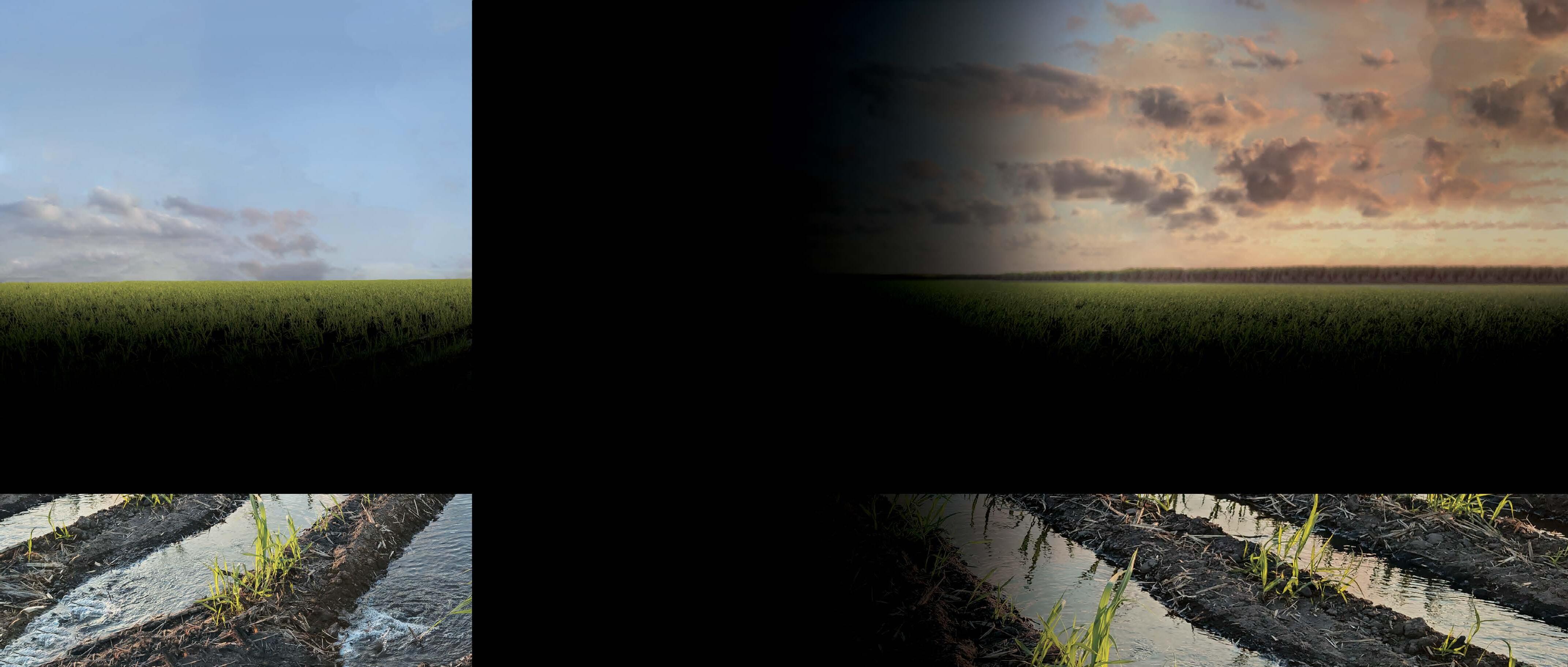
BY MICHAEL QUIRK
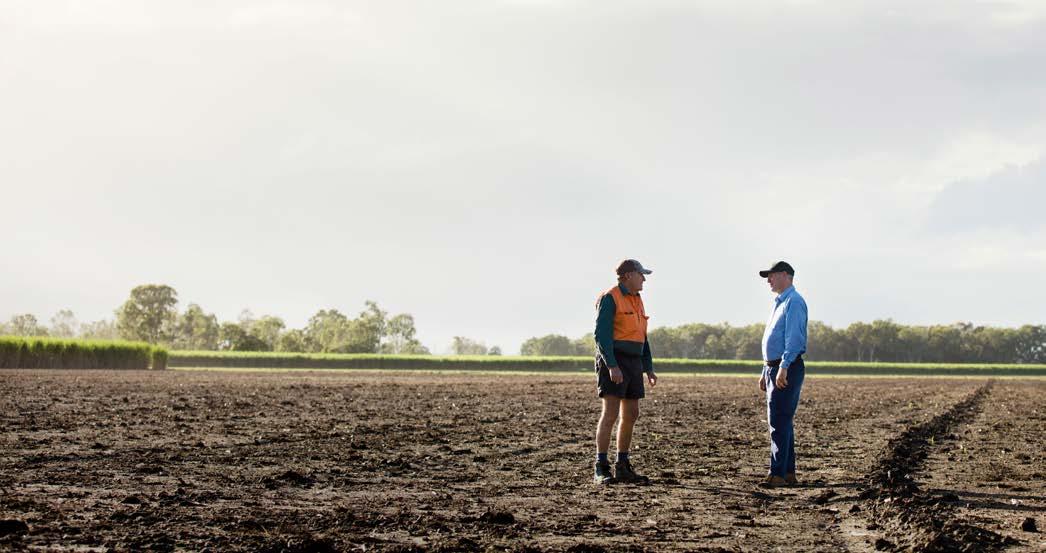
Sugarcane farming is a mature industry, with a history of hard-won experience and a strong legacy of research and innovation.
As a result, farming principles that optimise productivity, and the practices that meet these principles, are well-established and generally widely adopted.
These evidence-based principles and practices are the basis for the practice framework in the Smartcane BMP Program. And the modules are regularly reviewed by Sugar Research Australia (SRA) and other subject specialists to ensure they are based on the latest research and field experience.
Smartcane BMP recognises that every farming business is different, with different soils and climate, scales of operation, historical development, and availability of capital. And farming families have different ambitions and needs.
Smartcane BMP is based on industry tools that can tailor principles of good management to the needs of each farm.
For example, nutrient management principles are based on those of the SIX EASY STEPS program, which has been designed to tailor its nutrient recommendations, via soil testing and evidence-based calibrations, to the major soil types in each district.
When Smartcane BMP first commenced, its primary role was to help secure the industry’s social licence, and thereby minimise regulation of farm practices.
Increasingly, the program has provided growers with recognition of their innovation and success as farmers.
The Rocky Point cane growing district is a prime example of this. Situated on the coastal plains between Brisbane and the Gold Coast, the district does not fall within the Reef Catchments captured under legislation.
Minimising farm regulations is not a motivator for these growers. Their strong participation in Smartcane BMP is driven by the program’s
recognition of their good farm practices and their commitment to innovation. The latter included working with agronomists to customise the SIX EASY STEPS program to the soils of their area.
Smartcane BMP can serve multiple functions for growers, from securing their social licence to recognising industry excellence, through its focus on productivity, profitability, and environmental stewardship.
The program is also underpinning efforts to retain higher priced markets and the brand reputation of Queensland raw sugar.
CANEGROWERS delivers the Smartcane BMP project (2022-2026) with funding from the Queensland Government’s Reef Water Quality Program and CANEGROWERS

Let’s show off the great work you’re doing.
The destination’s the same, but the journey’s different for everyone.
Contact your Smartcane BMP district facilitator to discover what accreditation could look like for you.
BY OWEN MENKENS, Chair, CANEGROWERS

The crush is finally over, time to start looking ahead.
The crushing season has finally wrapped up, and the wet season is now upon us. As I write, there’s talk of a potential low and a cyclone forming in the Coral Sea. Let’s hope we avoid a repeat of last year’s events in the north, which had a significant impact on those regions.
The aftermath of the 2024 season revealed record-low yields in some northern areas, driven not just by a single weather event but also by prolonged cloudy conditions during the peak growing season.
Cane yields in Cairns, Tablelands, Innisfail, and Tully were well below average, as reflected in the final harvest figures. This serves as a stark reminder of how profoundly weather can affect growth – something growers, unfortunately, have little control over.
Here’s hoping the sunny weather seen in December and January continues in the wet tropics, offering better conditions for the 2025 crop.
Statewide, the situation was challenging too. Queensland managed to crush only 27.3 million tonnes of cane, one of the lowest totals in recent years.
In regions like Herbert, Burdekin, Proserpine, Mackay, and Rocky Point, nearly a million tonnes of cane remained unharvested, largely due to poor mill performance and wet weather – reminiscent of the 2022 crush.
On a brighter note, the southern region defied the trend, with reasonable yields and mills operating at full capacity.
Encouragingly, the Bundaberg/Isis region appears to have more cane ready for the 2025 season. While forecasts suggest higher totals for the coming year, much will depend on weather conditions and mill efficiency.
It’s a busy time for CANEGROWERS as the meeting season kicks off.
Nominations for district board directors will open soon, with 2025 being an election year.
I strongly encourage all growers to consider stepping up for a role within our organisation.
Serving as a director is not only personally rewarding but also offers a chance to build meaningful friendships within the community.
If you’ve ever thought about contributing, now’s the time to get involved at the district level.
Looking ahead, Sugar Cubed conference in Brisbane this April is shaping up to be a highlight.
With an impressive line-up of speakers already confirmed, it promises to be a fantastic event.
It’s a great opportunity to connect with others across the industry, share experiences, and gain valuable insights.
The conference coincides with the ASSCT (Australian Society of Sugar Cane Technologists) Conference, providing attendees a chance to see the latest research and developments in our sector.
I highly encourage everyone in the sugarcane growing community to attend – both for the knowledge shared and the friendships formed. I look forward to catching up with many of you there.
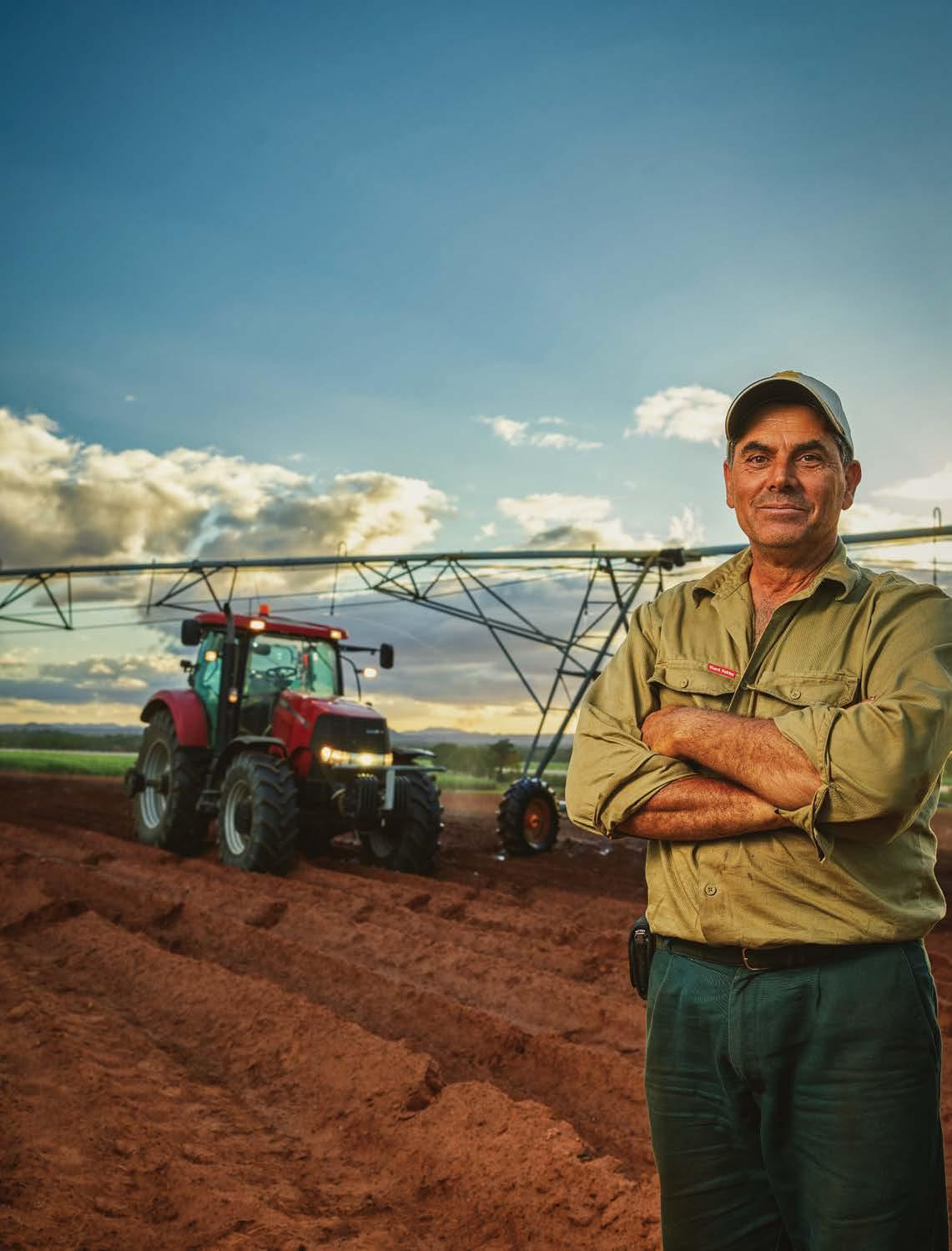
For more than 90 years CANEGROWERS has represented the interests of the sugarcane farmers of Queensland. Through times of challenge and opportunity, CANEGROWERS has helped family farms and the whole industry to grow and prosper.
CANEGROWERS is known and respected for its strong voice locally, nationally and internationally—the collective voice of many farmers has a powerful impact.
Growing your business | Growing your industry www.canegrowers.com.au
BY RENEE CLUFF
A new project is assessing the viability of filling the gaps in Australian sugarcane rows.
Empty spaces between sugarcane stalks afflict even the most productive sugarcane growers and can be attributed to anything from poor plant strike to wet weather, harvesting and more.
Veteran Extension Officer and CANEGROWERS Innisfail Manager Debra Telford said gaps decrease yields and create a domino effect to impact ongoing profitability.
“When we talk about the costs, we have to consider the whole farming system,” Debra explained. “When we have gaps, we’re more prone to weeds, so there are more herbicides needed for instance.
“Managing those gaps, however, can be difficult because growers need to work out the point at which it’s worth taking action and to do this, they need to consider potential causes, the ratoon age and the cost benefit of replanting.”
A new project by the University of Southern Queensland’s (UniSQ) Centre for Agricultural Engineering aims to help growers answer those questions
Top: Gaps in rows near Innisfail
and perhaps provide a cost-effective solution to managing gaps.
Farming systems Professor Bernard Schroeder said it involves two researchers under the guidance of Associate Professor Troy Jensen who will work with growers in the Innisfail District.
Somwang Leekar is on a Thai Government-funded scholarship at UniSQ and is using machine learning to investigate the causes of gaps.
At the same time, Mechatronic Research Engineer Bruen Smith is working to determine whether it’s economically viable to fill in gaps using an automated process.
“The two projects involved here include Somwang determining what is a gap and what has caused the gap and then Bruen’s project is how do we remedy the gap and is it viable to do so?” explained Prof Schroeder.
“It’s a good example of how projects can work together and support each other.”
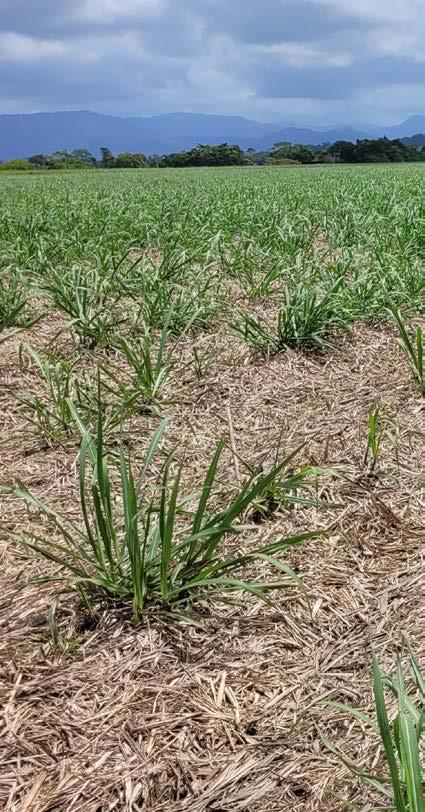
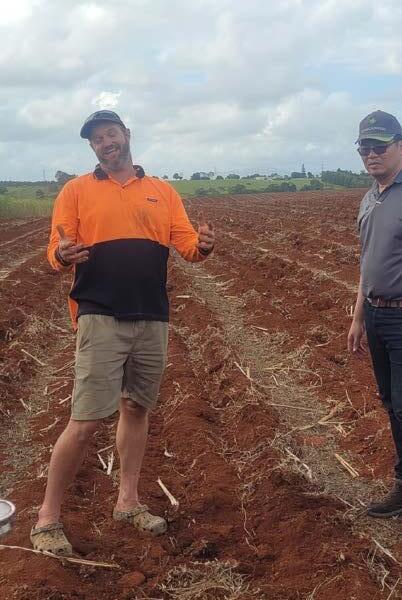

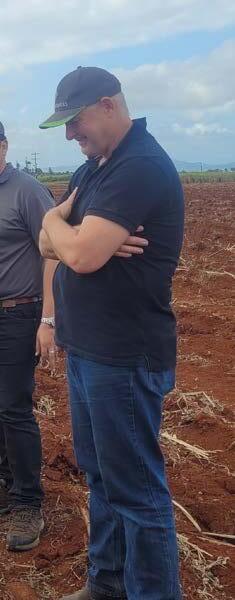
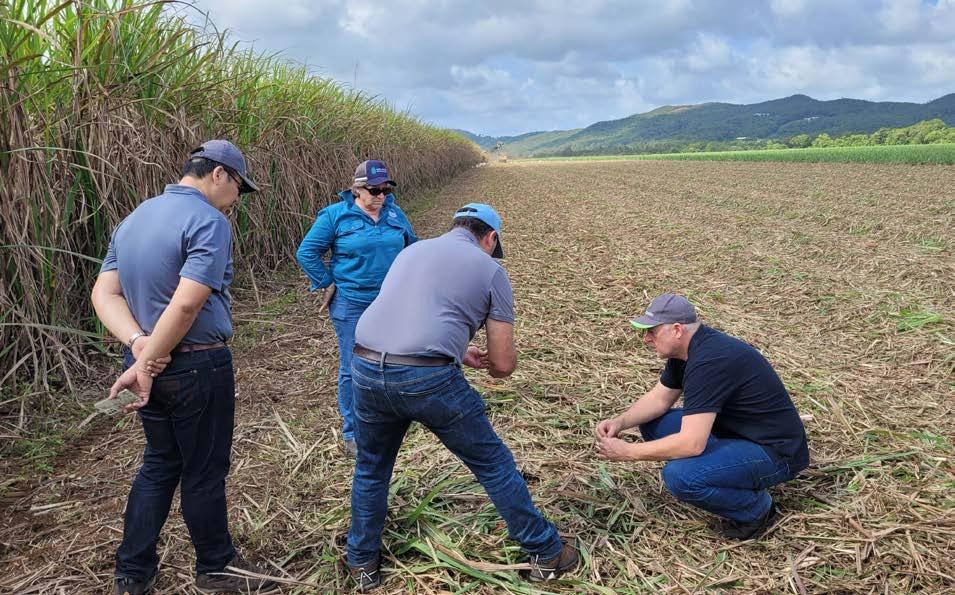
CANEGROWERS Innisfail is collaborating with the researchers by offering first-hand knowledge of the issue along with advice about how a new system might integrate with farm management practices. Blocks have also been set aside for trial work.
Chairman Joseph Marano was among Innisfail growers to recently host the researchers as they sought to ensure their work leads to practical outcomes.
“They wanted to understand the farming systems that are in place in this area and what might be possible,” Joseph said.
“They were very interested in all the machinery and implements and of course, we showed them paddocks where there are gaps.
“There was plenty of discussion and debate around potential thresholds for going ahead and filling in gaps, as well as the need for a simple, costeffective, automated process to do so. Any solution has got to be fool-proof.”
Somwang Leekar said the experience was highly beneficial.
“It helped me to better understand –I have never seen the activity in the

sugarcane in Australia before and it is quite different to Thai sugarcane growing,” he said.
“I hope I can guide the sugarcane grower to prevent the gaps happening in the field. That way, they won’t lose the fertiliser, or the irrigation, or other inputs. At the same time, the yields of the sugarcane per area will not decrease.”
At the foundation of both projects is software already developed by Bruen Smith that can use machine vision to distinguish and measure gaps in rows.
“We will look at the yield decline caused by the gaps as well as the other problems gaps contribute to such as weeds and ingress of pests and diseases, and how much of a problem gaps actually are in the scheme of things industry-wide,” Bruen said.
“We did some previous work where we could create a map, and we are now focused on the solution. We’ve come up with some conceptual ideas and looked at what others are doing around the world.
“In India they do quite a bit of gap filling and they do it all by hand, but because that’s so expensive in Australia the industry is not doing it. That’s why we’re looking at automating the process.
“At this point we’re looking at something fairly automated but that will depend on whether it’s economical to do so given the fact that not a lot of people have RTKs (Real-Time Kinematic positioning, or GPS guidance systems). There are a lot of factors that will go into determining the best system and what would be the most useful.
“Is it going to be something that individual farmers purchase or something a contractor would do? At this point, the latter is probably more viable, but it’s something we have to analyse.”
The researchers investigate gaps in a block near Innisfail

Debra Telford said growers are prepared to think outside the box.
“The plant material doesn’t have to be the traditional billet, you might grow seedlings from one-eyed setts in preparation and plant those,” she said.
“As an end game system if we’ve got access to good images, we can advise growers when gaps start appearing or maybe AI can assist in predicting gaps, so we know at the day of harvest if we need to fill those gaps.”
Bruen’s research is funded through Sugar Research Australia. Both projects are expected to be finished by mid next year.


Influence
Brazil
India
Thailand
Speculators
Currency
Your Trusted Partner
Current as at 21 January 2025.
By Elliott Apel, QSL Assistant Manager Trading & Risk
Outlook
By the end of December, 613 million tonnes of cane had been harvested and 39.8 million tonnes of sugar produced at an average sugar mix of 48.16% in Brazil. With only 45 mills still operational in early January, final production numbers for the 2024/25 Season could fall just short of the 40 million tonnes of sugar mark. Rainfall in São Paulo was below average for the first half of January, with only 338mm recorded. Neutral
After months of speculation, the Indian government approved 1 million tonnes of sugar exports for the 2024/25 Season. The decision comes despite sugar production lagging behind last year’s figures by almost 2 million tonnes. Forecasts for the season estimate 28 million tonnes of sugar production which would likely mean exportable sugar will draw down on stockpile levels, assuming 4 million tonnes of ethanol diversion.
Thailand’s sugar production is operating at full capacity, with all 58 mills active. By 19 January, 37 million tonnes of cane had been crushed, yielding 3.7 million tonnes of sugar.
Speculators sold heavily into ICE 11 futures, building their net short position to the largest since November 2019 in the lead-up to the Indian government’s export announcement. As of 14 January, speculators held a net short position of 106,000 lots.
Neutral
The Australian Dollar (AUD) traded to its lowest level in four and a half years at 61.31 US cents in January. The AUD has been weighed on heavily by views of an improved US economy under the Trump administration, fears of global trade wars as well as Chinese economic weakness. The outlook ratings above are in relation to AUD/tonne sugar prices. A bullish outlook is considered positive. A bearish outlook is considered negative.
The highest grower-managed pricing levels achieved across all growing regions using QSL products to date (all gross price actual/tonne) are:
• 2024 Target Price = $840 / IFC $870 (Jul24)
• 2025 Target Price = $735 / IFC $735 (Oct25)
• 2026 Target Price = $685 / IFC $690 (Jul26)
• 2027 Target Price = $650
• 2028 Target Price = $550
Key Dates:
• 20 February 2025 | Any 2024-Season Target Price Contract tonnage not priced by this date will automatically have its pricing window extended and roll costs may apply.
• 20 February 2025 | Any unpriced tonnage allocated to the ICE 11 March 2025 contract through the Individual Futures Contract and/or Self-Managed Harvest Contract that is not rolled by this date will be priced by QSL at the next market opportunity.
• 20 February 2025 (MSF Sugar districts) | Any unpriced tonnage allocated to the 2024-Season Target Price Contract and ICE 11 May 2025 contract through the Individual Futures Contract will be priced by QSL at the next market opportunity unless MSF Sugar grants approval to extend the Pricing Completion Date to 20 April 2025.
2025 & 2026 SEASONS






Shield is a highly systemic and effective insecticide registered for the control of Greyback and Childers canegrub in sugarcane
• Highly effective soil applied control
• Rapidly stops canegrubs from feeding
• Improved control versus imidacloprid
• Acts through both ingestion and direct contact
• New more affordable pricing


With four successful years behind it, CANEGROWERS Business Essentials continues to empower growers to achieve their goals.
In today’s rapidly evolving world, to ensure effective productivity its important to utilise the best management practices available.
Chris Gillitt, Farm Business Resilience Project Manager and Business Essentials Coordinator, is a firm believer in the transformative power of these practices. To ensure the program remains relevant and impactful, Chris and his team have been actively engaging with growers, conducting extensive research, and collaborating with industry experts.
“The upcoming workshops and webinars for 2025 will feature a training partner with a wealth of experience in guiding farmers from various sectors, including cotton, grain, horticulture, and dairy,” Mr Gillitt said.
“This diverse expertise will provide growers with a comprehensive understanding of different aspects of the agricultural industry, enabling them to make informed decisions and drive their businesses forward.
“The sessions will cover a wide range of topics essential for business success.
Growers will learn valuable strategies for HR management, including attracting and retaining talent, as well as WH&S support to establish effective systems.
“Additionally, there will be sessions dedicated to sugar pricing strategies and sugarcane-specific topics, ensuring growers have a deep understanding of their industry.”
The Business Essentials program has already made a significant impact on growers of all backgrounds. Paul Schembri, a grower from Mackay with 40 years of experience, found the program to be a valuable resource for enhancing his business. Despite his extensive industry knowledge, Paul recognised the importance of continuous learning and improvement.
“Principally you can never know enough about the management of business and in our circumstance that is cane farming, and all the allied aspects of that, such as sugar pricing for example,” Mr Schembri said.
“So firstly, even though I’d been heavily involved in the industry as a representative of growers with CANEGROWERS , I felt that I could still learn things to help my business, that was my primary driver.”

Business Essentials Workshop in Mackay
For emerging growers like 18-yearold Jessie Borg, the program offers a unique opportunity to gain industryspecific knowledge and support their family business. Jessie, an agribusiness student, attended the full two days of the 2024 Business Essentials Workshop in Mackay. The workshop not only complemented her studies but also provided valuable insights into the costs and intricacies of cane farming.
Jessie Borg’s family farms along the Pioneer River at Pleystowe, on the 180 ha “Barnganal”. While her father, Joseph, is the primary operator of the farm with her mother Amanda working in the administrative areas, Jessie is learning and assisting in the family business, which also includes cattle interests in the Blue Mountain district south of Mackay. She also works in project delivery with Sugar Research Australia-Central Region.
“I’m interested in learning more about business concepts that are relevant in the sugar industry,” Ms Borg said.
“I am looking at the standard sort of book work that farmers have to go through. I have seen what Mum and Dad do, but I haven’t yet learnt how to do everything.
“I want to understand what the farmer has to do. That works hand-in-hand with what I am doing at Uni. But I also want to understand the costs involved in cane-farming.”
The program has also proven instrumental in assisting growers with specific needs. Darrin Vella of Vellaroo Farming, for example, successfully applied for a Drought Preparedness Grant with the support of CANEGROWERS Proserpine District Manager Brendan Nothard.
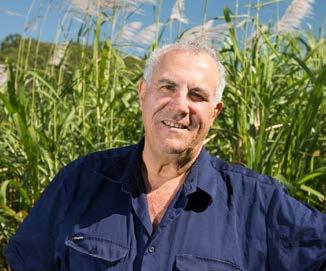

This assistance not only helped Darrin secure the grant but also prompted him to think strategically about risk management and set clear goals for his farming business.
“We were very thankful that Brendan was able to help us with the grant application process. We had never done a business plan before and would

have found this quite challenging without his help. The process was very interesting,” Mr Vella said.
“We applied for the grant that QRIDA was offering after hearing that a family member had been successful with their grant application, and we had also seen it advertised in the Australian Canegrower magazine.
“We thought it would be a great opportunity to get some financial assistance with the installation of underground irrigation that would enable us to irrigate more of our sugarcane farming land in a quicker space of time.
“We had not used a program like this before and we were successful with our application and so far, have purchased the equipment required for our underground irrigation project and are awaiting suitable weather for installation.
“We would recommend this grant to other growers and would strongly advise seeking assistance with the application if you are unsure.”
The Business Essentials program will kick off with a one-day workshop focused on “building a professional business.” This workshop will provide growers with the tools and strategies
Herbert River: Tue 18 Mar
Burdekin: Wed 19 Mar
Proserpine: Thu 20 Mar
Mackay: Fri 21 Mar
Tully: Wed 26 Mar
Innisfail: Thu 27 Mar
Cairns Region: Fri 28 Mar
Childers: Wed 02 Apr
Bundaberg: Thu 03 Apr
needed to secure a sustainable future for their businesses . The series will then offer some topical webinars that participants can choose to join and will then hold another day of local in-person workshops covering bookkeeping in the morning, and a focus on the sugar market with pricing strategies, and how the cane price is determined. We would like to see growers attend the first session and then decide on which of the subsequent topical sessions to join. For more information and upcoming dates visit www.canegrowers.com.au or contact your local CANEGROWERS district office.

“I’ve been waiting since GPS came into the sugar industry for reverse fill haulout tractor autosteer; Arrow has delivered.”

BY RENEE CLUFF
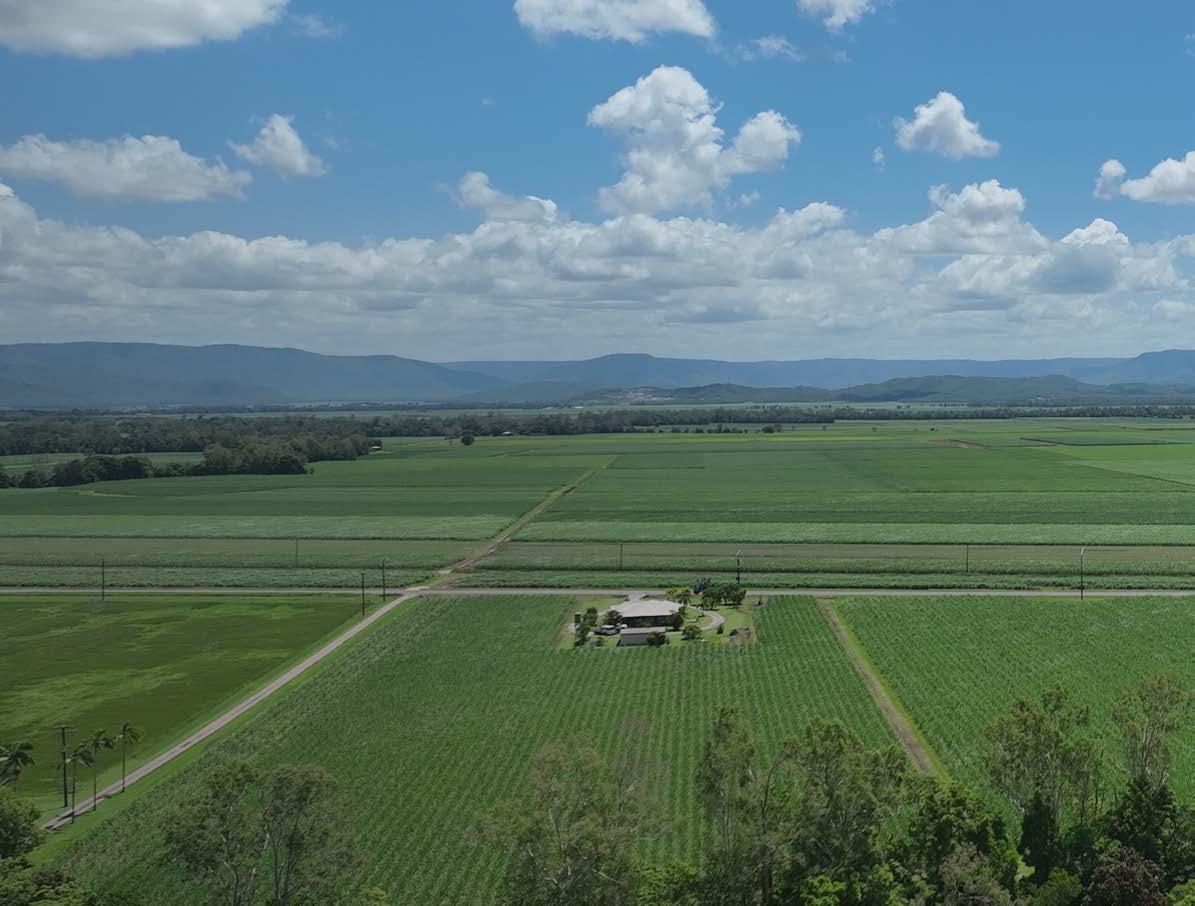
A Herbert River sugarcane grower has created a wealth of opportunities through his strong work ethic and willingness to adapt.
Tony Crisafulli is a living, breathing epitome of Australia’s principle of a fair go. After migrating from Italy in the early 1960s as a nine-year-old boy, he and his father Francesco carved out a legacy for future generations, which has paid dividends.
Today, Tony oversees just over 500 hectares of productive cane land just outside Ingham and sends around 40,000 tonnes to the Victoria Mill each year. It’s a far cry from the situation his family was in prior to migrating.
“Dad was working in Italy and getting nowhere fast,” Tony said. “He was leasing land – he’s always been on the land and back then, it was mixed farming including crops such as olives and wheat. He was getting 20-per-cent of the returns while the owner got 80-per-cent, even though Dad did all the work. He was only making enough to barely stay alive.
“Dad’s brother left first to cut cane in Queensland and Dad followed. He was fairly old to cut cane at age 37 but he was very keen. They were fussy on who they would pick to migrate, and Dad tried once and got rejected, he tried again and got accepted. So, he got on a boat and we stayed back in Italy.
“He started cutting cane in 1960, the work was very hard, but he adapted and by the end of his second year, he was a champion cutter. He’d lead the pack all day and the younger ones had to try to keep up. When it came to loading, they had 16 trucks to a gang of five, so there was always one truck left over and he’d load it on his own –that’s how fit he was.
“Once the season finished, he’d go to Mareeba to pick tobacco and also graded tobacco. Grading is a job where you are on contract – the more you

do, the more you get paid. He used to work 20 hours a day over a two-month season. He was probably making more than a doctor.
“He loved it because his hard work was recognised”
Tony, his mother and two sisters moved to Australia in 1961 and just a couple of years later, Francesco and a couple of family members chipped in to purchase a harvester.
“They delivered it brand new and I thought, ‘wow!’. When I was 11 years old, I could drive it, I washed it, all I wanted to do was harvest.

“We are probably one of the only contractors left who have been continuously harvesting since 1963. Most of them have come and gone. We have been cutting the cane on some farms for more than 60 years. That’s an honour and it’s something Dad started.”
Tony left school at age 14, working for the harvesting business during the season and like his father before him, travelled to other regions to supplement his income. After doing everything from picking fruit in Griffith,


New South Wales, to building the Fairbairn Dam in Emerald, he’d made enough money to contribute to the purchase of the family’s first farm.
“Dad didn’t pass on the farm to me, we bought it together,” he said. “I was in charge of farming and helped Dad with the harvesting during the season.
“If we finished on Friday at 2 o’clock, I’d go up Friday afternoon, Saturday and Sunday working the farm and then Monday morning I would get up at 2-AM and go and service the harvester so that when the men came at 5-AM, we were ready to go,” he recalls.
When Tony was aged 20, he married his wife Karen (nee Fanti). She was also from a cane farming family so was well aware of the hours Tony would be working.
He put those hours to good use. Willing to give almost anything a go, Tony was an early adopter of many practices, from stool splitter fertiliser application to using GPS for precision farming and harvesting. Tony is BMP accredited and fallows between 15 and 20-per-cent of his land every year, planting legumes as a break crop.
“We’re always trying things,” Tony said. “When harvesters first came out, we bought one and upgraded it and we were among the first to cut green. All the neighbours were looking around, saying, ‘It’ll never work!’ and I actually had a lot of trouble convincing my father.
“But when he looked at the comparison in one block between what we’d cut green and what we’d burned, he became a believer. We had less grass, less weeds, and the cane thrived.
We’ve been green ever since.
“More recently, we were involved in a mill mud trial. We made a furrow, and they put the mill mud in there at different rates across a whole paddock.
Tony’s family has been contract harvesting since 1963
“There’s one block where we placed mill mud that we’ve replanted, and the cane is as good as if it had been fallow ground. The cane just picks it up when it’s in a furrow.”
Tony was also a bin hauling champion for many years, his speed and precision in reversing and hitching a trailer put down to years of experience.
“I’d back up flat out onto the points,” he reminisced. “If you won, you won it by half a second, it was just like V8 Supercars. If you made one little mistake, you were gone – it was all over.”
Tony has plenty to be proud of, but what gives him the most satisfaction is seeing his family thrive. He and Karen had two children, Belinda and David. Unless you’ve been under a rock, you’d be aware David recently became Queensland Premier.
“David is a bit like his grandfather –go, go, go – he probably works 18 to 20 hours a day,” Tony revealed. “He just wants a better Queensland. He wants to change things.
“He’s got a hard job ahead of him”
Sibling Belinda owns and runs three fashion boutiques and also does the accounting for the family harvesting

businesses. “She has the best clothes in Ingham or Townsville,” Tony boasted. “She gets all the good brands.”
His grandchildren, nieces and nephews are also high achievers across a range of industries, from medicine to defence, engineering, entrepreneurship and more. Grandson Jaidyn Spina, a school teacher, will probably take over the farm, while son-in-law Andrew Spina also plays a big part in the day-to-day running of the business.
“My dad was probably the last migrant who came out that actually bought into cane farms in this district,” Tony muses. “Later on, it just wasn’t possible anymore.
“If my father was alive now, to see how his family has achieved, he’d be so proud”
“We could have gone back to Italy and bought some land, but it never crossed our minds. My dad said this is where he wanted to die. This is home now, it’s where we want to be.”





















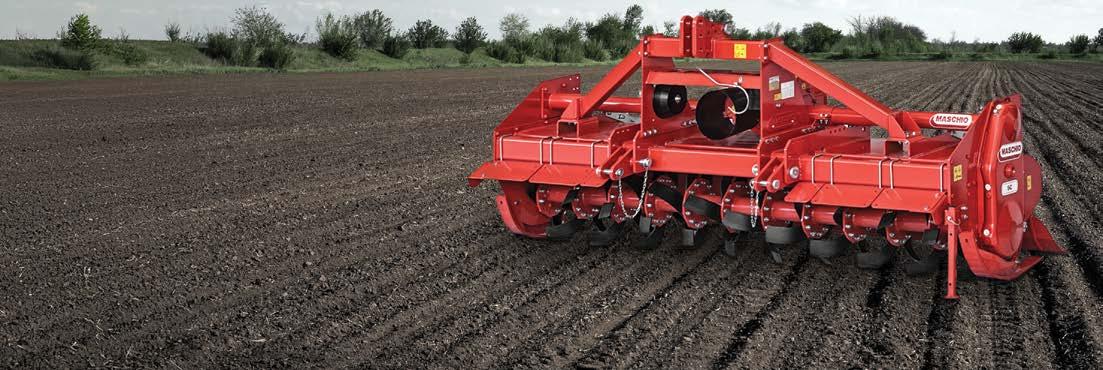



Fire ant nests have been found in North Arm, a rural town in the Sunshine Coast Region and outside the current fire ant biosecurity zones.
A landscaping company reported the nests to the National Fire Ant Eradication Program on 16 January 2025. They provided photos of the suspect nests, which were deemed suspicious. In total, nine nests have been located. The eradication program treated the fire ant nests and will be continuing methodical treatment and
surveillance of all properties in the area to ensure that no nests were missed. All residents and business owners in North Arm and nearby suburbs are urged to check their properties now and report any suspect fire ants and nests.
The map shows a 5 km radius from the recent detection. The National Fire Ant Eradication Program uses a 5 km radius because this is the distance fire ant queens are known to fly, making this area at higher risk of spread. They have taken samples from the nest for genetic testing to help determine the source of the infestation.
Businesses and individuals working with materials that can carry fire ants, including soil, fill, quarry materials, potted plants, mulch, turf, compost, hay, or animal manure need to follow legislative movement controls. These controls apply when moving them from or within the biosecurity zones.

When receiving construction, landscaping, or other organic materials, it’s important to ask the supplier whether the materials have been processed, stored, and treated using fire ant-safe practices.
Under the Biosecurity Act, everyone is required to regularly check their properties for fire ants, report any detection of fire ants, and take all reasonable steps to prevent their spread. To learn more visit www.fireants.org.au
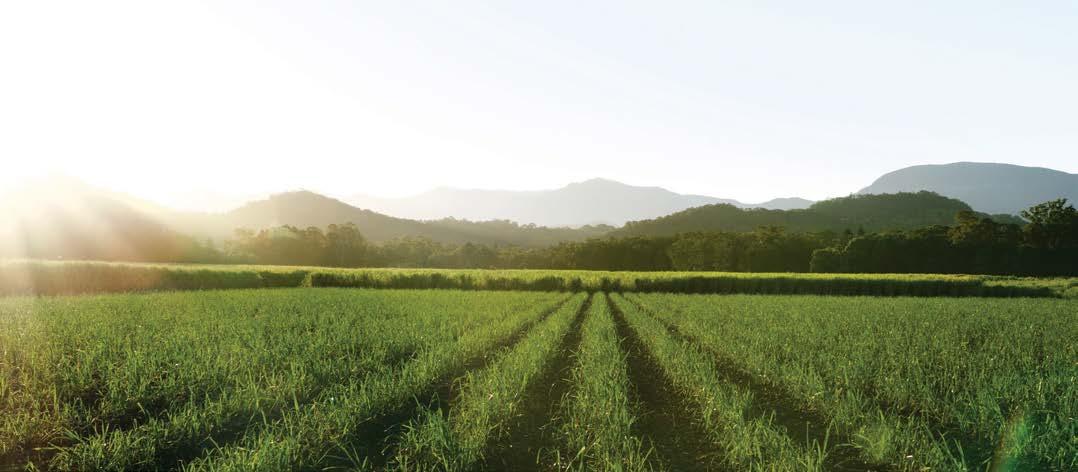



Busy sugarcane growers working in the districts may only know SRA’s laboratory services in Brisbane for RSD testing, with about 12,000 RSD samples analysed for the sugarcane industry each year.
“We think of SRA’s laboratories as the organisation’s beating heart,” Head of Laboratory Services Dr Heidi du Clou said with a smile. “They play a central role in every process in the production of sugar – from growing seedlings in the nursery, through to determining cane quality in the mill.
“SRA laboratories are providing essential services to the industry on a daily basis – from the analysis of soil nutrients, studying the genetic traits of varieties, identifying pests and diseases, to analysing agricultural chemicals in plants and soils, determining components of runoff, and nutrient status of plants and mill byproducts,” Dr du Clou said.
“It is not just the grower who benefits but also the miller; SRA has developed calibrations for benchtop Near Infrared (NIR) instruments which are used in mill labs to measure multiple mill products in a fraction of the time compared to traditional methods,” she said.
“An online NIR instrument has also been calibrated to determine the losses of sucrose to mill mud in near real-time.”
Dr du Clou explained that SRA’s laboratories supported the advancement of these technologies and continue to do so following the move from Indooroopilly to Acacia Ridge. Now known as the Innovative Research & Industry Services Laboratories (IRIS), SRA continues to offer a large range of services in the fit-for-purpose premises.
Using quantitative polymerase chain reaction (qPCR), the laboratory provides Ratoon Stunting Disease (RSD) diagnoses to Productivity Services bodies and focuses on sugarcane xylem sap and leaf sheath biopsy samples. The lab carries out RSD testing on leaf tissue, stalk core tissue and extracted DNA for research purposes.
Domestically, SRA Quarantine facilitates the movement of plants from SRA’s variety development program in and out of sugarcane biosecurity zones, and also facilitates the import of foreign germplasm for variety development.
Plants are quarantined in a government facility in Victoria, during which SRA performs testing for several exotic and endemic diseases. Once released, the new clones are grown, multiplied through tissue culture and distributed to variety development to be used as parents.
Sugarcane identity (DNA) tests are conducted where the laboratory uses disease-associated molecular markers to aid early selection of resistant varieties and Single Nucleotide Polymorphism (SNP) genotypic data which is generated and analysed to support genomic selection.
The team in the Tissue Culture laboratory supports industry by supplying commercial sugarcane varieties as clean disease-free seedlings to help manage serious diseases that are spread by seed cane.
Molecular pathology helps the industry by improving diagnostic tools for domestic and exotic pathogens.
It works closely with the RSD testing and quarantine functions and provides molecular diagnosis of many diseases where required. It also aims to incorporate molecular techniques into variety screening methods.
The Cytogenetic Lab uses its own pioneering method to decode the complete chromosome set of sugarcane cultivars and determine their species’ origins. This knowledge supports variety development by guiding breeders in creating improved cultivars.
The cytogenetic contributions played a key role in a breakthrough that underpins research to develop enhanced varieties for the industry. The lab also offers international services, advancing global understanding of sugarcane genetics.
The Chemistry labs provide a suite of analyses to support R&D projects for stakeholders, and services to growers and millers:
Nutrition (soil, plant and water)
The labs are equipped with high-end instrumentation and highly skilled staff, with significant expertise in the analysis and interpretation of products specific to the Australian sugarcane industry. Researchers, Productivity Services groups and growers send samples to our laboratories which are accredited for nutrient analysis by the Australasian Soil and Plant Analysis Council (ASPAC).
The development of NIR was supported through the wet chemistry analysis of grower soils, sugarcane, and all mill products to build and maintain NIR calibrations.
The SRA breeding program is supported by analysis of quality variables in sugarcane clones. Various analyses are also provided to measure impurities in milling streams.
The internal SRA database, SPIDNet, is used by Variety Development as a tool for efficient data storage and retrieval. It streamlines processes for all users, for better outcomes for the sugarcane industry. SPIDNet is now expanding to other disciplines.
For more information about the new IRIS Laboratories or if you are interested in visiting, please email SRA@sugarresearch.com.au

SUPPLIED BY CANEGROWERS DISTRICT OFFICES


Our December rainfall reverted to being over the monthly average by quite a way being 609.6mm against the monthly average of 351.84mm.
However, the rain was from storm activity and not what we would consider the normal wet season in the tropics.
Given the late finish for the crushing, we didn’t need the big
wet to hit again in December so growing conditions remained good for the crop but much of what was cut will be fertilised late or not fertilised for 2025.
It was another big year for rainfall in 2024 with almost 4 metres of rain falling – 3,983.9mm. The 56year average sits at 3,116.08mm.
The rainfall in January 2025 mirrored December with storm activity continuing and
dropping some heavy showers but the summer wet season did not make much of an appearance at all.
It was a busy start to 2025 with the final lots of property for Mossman Mill being put up for sale; the lots including the spare land situated beside the mill, the mill site, factory, buildings, and houses. The figures and payments were finalised for both 2024 standing cane and for increased transport assistance.
On Sunday 19 January, well over 50 people including growers, Local Member David Kempton MP, the Mayor and Douglas Shire Council staff, and various state government representatives got to meet and hear from another group (SEATA) about the possibilities
of sugarcane, Bana grass and other carbon products being used for Biochar and other bio, gases and fuels, and carbon negative products.
The northern district managers had a meeting on 23 January to discuss issues and problems being faced in the north prior to attending a full district managers workshop in Brisbane on 29 January.
Also ramping up is another round of Terrain NRM projects that have been funded involving Water Quality Improvement, land restoration work and Reef Wise farming projects. A workshop was held on 30 January about water quality improvement and a coastal reef restoration workshop is planned for mid-February 2025.
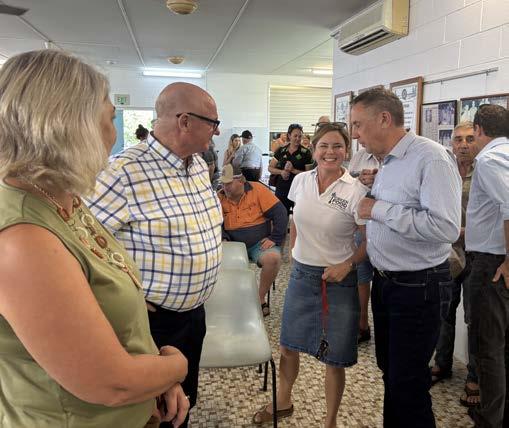
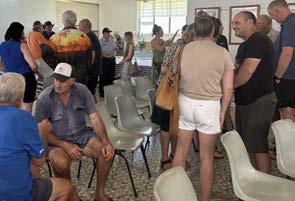
The past month has seen 149 mm for January with some hot days hopefully leading to good growing conditions.
Growers are concerned that they have been unable to get on paddocks to finish off the crop.
Representatives from the Mill and CANEGROWERS have met to discuss the season
and to ensure that all parties are working together to have the crush run as efficiently as possible.
QUBE has purchased a new fleet of trucks to ensure that transportation runs more effectively.
This season is looking optimistic and there is hope that the productivity will improve.

The crop is currently growing well across the district as a result of the recent storms and ongoing warm weather.
Fallow crops are also growing vigorously, with many of the Sunn Hemp crops looking amazing. See the difference two-months growth can make as pictured, from planting to close to 2m tall.
To meet the increasing needs of members CANEGROWERS
Cairns Region has purchased another direct drill bean planter. This will assist growers across our membership base

with access to an implement when needed.
The annual review of the South Johnston Cane Supply Contract has commenced, with Grower Representatives of the Industry Management Committee meeting recently.
CANEGROWERS Cairns Region continues to lobby local political representatives across the region to raise the profile of the industry and highlight its importance to the local economy.

CANEGROWERS Innisfail has officially settled into its new office location at 88 Rankin Street, Innisfail.
We’re excited to be in this new space and are looking forward to connecting with our local community and growers in the area.
Whilst we have been in residence at the Australian Sugar Heritage Centre for the last 15 years and assisted the Australian Sugar Industry Museum committee to manage both the complex and the museum, the December 2023 floods made it no longer possible for us to remain at this location.
The building in Rankin Street Innisfail holds a lot of heritage for our organisation and local industry. Whilst settling into our new office, we uncovered

a commemorative plaque that had been taken down during renovations, this plaque emphasises the importance of the sugar industry to not only our local community but to all of Australia.
A quote from the media release from the opening of CANEGROWERS Executive Building Innisfail 6 September 1978 by then Prime Minster Malcolm Fraser:
“I am honoured to have been asked to be here at the opening of this building with you. I have great confidence both in the future of this industry and in the future of Australia.”
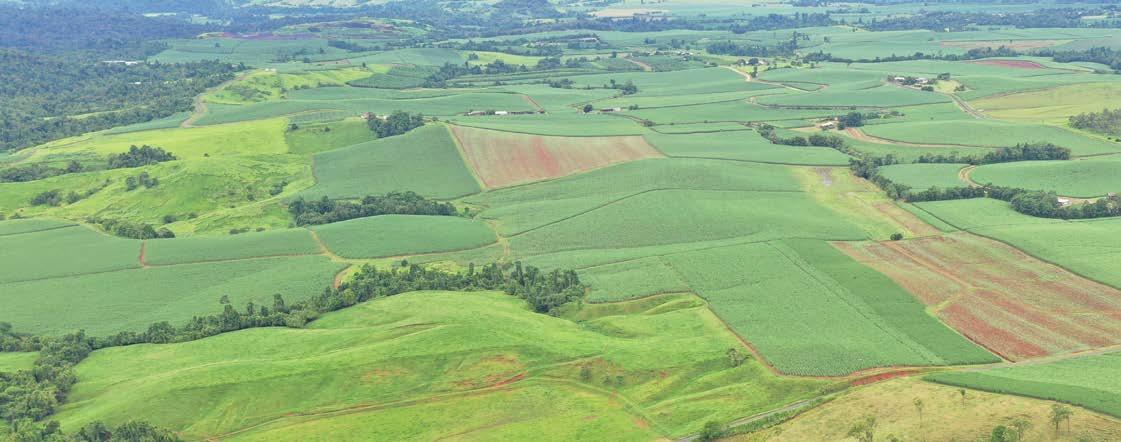
The 2024 season was a challenging one for the Herbert River district, marked by various setbacks that hindered progress.
Prolonged industrial action between the mills and unions, combined with mill reliability issues, transport delays, and unfavourable weather conditions, culminated in a season that extended until 19 December.
These factors collectively contributed to a disappointing harvest, affecting the overall outcome for the region.
In response, CANEGROWERS Herbert River met with the mill operators to review the 2024 season comprehensively.
These discussions will focus on identifying the root causes of the issues experienced and

exploring practical solutions to mitigate such disruptions in the future. The goal is to ensure improved performance and collaboration moving forward.
Looking ahead, we have planned a variety of events, workshops, and courses throughout the offseason aimed at enhancing our members’ businesses and skills.
Highlights include a Young Growers Trip to Cairns in March, the Women and Sugar Herbert River’s trip to Brisbane in May, the Escort Pilot Course in February, the Haulout Course in May, the Transport/WH& S Roadshow in April, and Business Essentials training in March.
We encourage all members to take full advantage of these valuable opportunities to strengthen their operations and improve their business outcomes.
We look forward to supporting you through these initiatives and ensuring that 2025 is a more productive and prosperous season.
“Thank God” was the first response from a contractor when Wilmar called for last cane on the line for Invicta Mill by 6.00pm on 17 January which finally brought the long 2024 season to a close when Invicta crushed out on 18 January.
There were some herculean efforts by growers and contractors working with the mill to get what cane off they could, and the photo below is a reflection of this with one grower sourcing three harvesters, 10 haulouts and four sidings on the last day at Invicta to harvest their cane.

CCS for the season was 13.90 which was below budget of 14.32. Out of an estimate of 8,200,000t, Wilmar crushed 7,965,295t of it, leaving a gap of 235,705t of cane which will largely be accounted for as standover.
In addition to this, there was thousands of tonnes of burnt cane condemned in the paddock.
Growers don’t pour their heart and soul into growing a crop to leave some of it behind in the paddock and then have to drive past it every day, but this is what happened in 2024 and the same happened not that long ago with the 2022 season.
So for the record, two out of the last three seasons has resulted in standover and burnt cane in the paddock which is not good enough. If mill reliability was at 90%, this would not have happened.
A meeting has been organised in early February with Wilmar to review the 2024 season and given the late season finish, we have asked Wilmar to clarify

the impact on their capex and maintenance program to get the factories ready for the 2025 season.
What are the positives for the 2024 season – we got 97% of the crop off, sugar prices are still at profitable levels and the value of cane farms remain high.
That said, we can’t escape the awful truth that it is plain wrong to be still harvesting cane on 17 January when the CSA has as a season finish objective of the third week of November.
Wilmar are quick to point the finger at wet weather and industrial action, but poor mill performance was also a significant contributor, and they simply didn’t have Pioneer Mill ready to commence the 2024 season on time, which in turn put pressure on the whole system.
One of the benefits of being a CANEGROWERS member is our superior CSA which has a payment in it from Wilmar for involuntary standover and Wilmar are currently finalising the classification of standover cane into voluntary standover (for which no payment is made)
A difficult and wet end to the 2024 season had Proserpine Mill finishing with 1,673,865 tonnes delivered by 14 December.
and involuntary standover (which qualifies for a payment).
Given the large amount of standover from the 2024 season, the standover payment will be diluted upon pro rata across the tonnages, but it is a helpful benefit none the less.
Please note that if growers need to change harvesting groups for the 2025 season, the Changed Grouping Application Forms are available for download from GrowerWeb or call into the office and we can print these off for you. These forms need to be submitted to Wilmar on or before 28/2/25 for processing.
We foresee some challenges with group changes this coming season as the number of contractors exiting the industry is increasing, contractors are becoming more finicky with whose cane they want to cut and siding access issues may be problematic to resolve. Please get your forms in as soon as you can so that issues can be identified and discussed with Wilmar.
2025 is going to be another busy year for the sugar industry and the season commencement will be on us before we know it.
With ensuing rains, the mill officially announced its closure on 17 December 2024 with approximately 70,000 tonnes of cane still left in the paddock. Despite an average of 4% standover for the season, an untidy finish to the crushing had several growers left with standover far exceeding the average.
Although mill performance improved over the second half of the season, earlier season problems with industrial action, sub-optimal mill performance and wet weather left too little too late for growers and harvesting groups at the end.
Cane quality for the season resulted in a mill average CCS of 13.83. This was marginally below the five-year average of 14.18. Unfortunately cane quality would drop by over three units of CCS from mid-October through to early December.
This again highlighted the need for a reasonable season length being limited to within the months of June and November that effected not only crushing but also cane quality.
It is hoped that recent improvements in mill performance can continue and
be carried into the upcoming seasons. This would result in a far a more positive outcome for all stakeholders and in turn build up confidence in the local industry where the investment into both the growing and milling of cane is key to longterm sustainability.
CANEGROWERS Proserpine continued to participate in discussions with both the Whitsunday Regional Council and the mill. A draft Memorandum of understanding is being negotiated that focusses on issues specific to industry.
The objective will be a guide for stakeholders on issues where collaboration is necessary to advance the local cane sector securing a future for both growers and the mill. Advertisements were made for a new Productivity Officer on behalf of Sugar Services Proserpine (SSP). Any interested party should contact the SSP or CANEGROWERS Proserpine offices.
Preparations for Board Elections are also underway with nominations opening on 24 February 2025. All growers are encouraged to participate in the election process should a ballot be necessary.
CANEGROWERS Proserpine wishes all growers a productive off-crop, good growing conditions and a successful 2025 season.


All four Mackay region mills have now called time on the 2024 harvest season.
Out of the three Mackay Sugar owned mills, Farleigh shut down with boiler issues on 18 December, then wet weather meant there was no re-start. Racecourse lost sufficient cane supply on 19 December, shut down and did not re-start.
While originally planning to continue until 19 January, Marian finished crushing on 13 January, citing lack of sufficient supply.
The Mackay Sugar season average CCS was 13.5. The total cane crushed for the year at the three mills stands at just under 4,850,000 tonnes.
After consultation with grower representatives, the Wilmarowned Plane Creek Mill finished crushing on Friday, 3 January 2025 due to there “being an
While the crush is over, proactive management of this cane can help minimise further losses and maximise future yields. Productivity services and agronomists can conduct thorough field assessments to evaluate the health and viability of standover cane.
The 2024 sugarcane crush drawing to a close marks the culmination of another year of
dedication and commitment from our region’s cane growers and harvesting contractors.
The industry has shown remarkable tenacity and adaptability in the face of difficult harvesting conditions. We salute the hard work, the sacrifices, and the unwavering spirit of our growers and contractors.

inadequate amount of cane being supplied to the factory on a regular basis to support the commercially justified operation of the mill”.
Season total was 1,301,230 tonnes and the Plane Creek season average CCS was 13.77.
With the New Year and the slack season comes an opportunity to train workers in the skills needed for the industry.
Pilot escort training, Agricultural Chemicals Distribution Control (ACDC) courses, and cane haulout training are all gearing up for the next batches of candidates. Anyone wanting to know more about training in the Mackay area should call 4944 2606
This year, many Mackay cane farmers are facing the challenge of significant standover cane due to poor mill reliability and extended season length.
Good rainfall, heat and sunshine has been received over the Christmas / New Year period and hopefully this is the beginning of a season that delivers good prices, good yields and high CCS.
We are currently in negotiations with Bundaberg Sugar to ensure the 2025 crop is harvested in a timely manner and we remain focused on achieving an outcome that is fair for all growers.
Sugar prices look strong for the next couple of seasons and with access to QSL Direct you can take advantage of many different pricing options. If you have not yet received training from Glenn Harris, Bundaberg CANEGROWERS encourages you to be in contact to make an appointment.
In late December Bundaberg Sugar and Bundaberg CANEGROWERS made a joint submission to the Bundaberg
Integrated Transport Strategy on behalf of the Bundaberg Sugar Industry.
The submission focuses on enhancing the freight transport network vital for moving crops from farms to markets; addressing the impact of active transport networks between Bundaberg and Bargara on landowners; improving flood resilience; and ensuring compliance with road rules for agricultural vehicles. The full submission can be viewed on our website.
There continues to be delays receiving Oreco payments and overdue instalments will be paid to growers upon receipt from Oreco, and interest charged per the Agreement.
Tickets are now on sale for the Bundaberg Sugar Industry Dinner and 2024 Season Awards being held on Friday 21 March. This is a great night to celebrate the achievements of the past season, please call the office to book your tickets.
The Isis District has been blessed with good steamy growing weather and some solid follow-up rain.
Most irrigators have been parked up since Christmas giving growers a nice break from irrigating. Of course, these conditions have meant a dedicated focus to keeping on top of the weeds. Late cut ratoons are significantly behind, and we are yet to determine what the effect on productivity of the 2025 crop there will be.
Growers have been taking advantage of the subsidised training courses being offered through our peak body membership with Queensland Farmers’ Federation. Chemical and forklift training are proving to be most popular with details on a haulout driver training course to be released soon.
Bundaberg Ag Food & Fibre Alliance recently held its AGM and will host the Bundaberg Ag Forum on 3 February. The forum will focus on key topics including why our region should be exempt from reef regulations, the Paradise Dam rebuild progress, the future of town planning in our region including the right to farm and turning farm waste into bioenergy.
Our first CSA review meeting with Isis Mill is scheduled for mid-February. Our CSA working group has met four times already this year working through the document with lots of work still to be completed. We have been making good use of the Mill Season Length & Time Accounting Analysis Tools CANEGROWERS have developed and are very grateful to have access to them.

The good growing conditions experienced through January has the 2025 crop developing very well.
Early cut cane has ratooned very strongly, and plant cane is also looking very good. Late cut cane has struggled with it often being too wet late November and December.
Improving operations has been a key focus of the harvester groups’ meeting that was conducted mid-January, to develop a plan for 2025 that links in better with transport than what has been experienced for the last few years.
We are working toward six operating fronts covered by
The 2024 Rocky Point season concluded on 10 December 2024 after 20 weeks of crushing a total of 193,683 tonnes of cane at an average CCS of 14.12.
Only 56% of the estimated crop was crushed.
The Mill had indicated in November that they were prepared to continue the harvest to 3 January 2025.
Due to the persistent rainfall and forecast of more wet weather to come, on 16 December we received a Notice of Termination of crushing from the Mill for 21 December, however, the wet conditions resulted in the Mill making the call that the season was over on 10 December 2024.
various harvester groups that are stationed with trucks returning to them. More will be explained as this develops.
From this meeting, we are now needing growers to progress with updating farm maps (these were sent to all growers at the start of January) to then work toward draft rosters.
A separate meeting of the truck subcontractors and Isis Mill was conducted 22 January with clarification of contract terms and operating models discussed with operating rules developed for the upcoming season.
Keeping on top of weeds is the big challenge at present, even my home lawn is needing a mow every week at present.
There was still 310ha of 2-year-old cane remaining – the equivalent of 45,000 tonne of standover, and a further 115,00 tonne of 1-year- old cane remaining in the field.
The growers were extremely disappointed to not have the opportunity to harvest more cane between Christmas and 3 January. This has been another disastrous season for Rocky Point.
At the time of writing, very few growers have managed to plant soybeans due to the weather conditions.
Another rainfall event of 100mls occurred during the second week of January.


31 March–1 April 2025
MACKAY
CANEGROWERS Network Mackay looks forward to hosting visitors from all the sugarcane growing regions across Queensland, with the WISA Conference providing an ideal platform to network and acknowledge the contributions of women in rural industries and primary production.
Information regarding the conference has already been distributed to the various CANEGROWERS offices in Herbert, Burdekin and Bundaberg regions for distribution and we encourage anyone interested to join us in Mackay.
Contact us for a registration form or any further information regarding the conference at canegrowersnetworkmackay@gmail.com.
All registrations must be finalised by 28 Feb 2025 for planning purposes.


The 2024 Sugarcane Transport Load Restraint Guide is a comprehensive resource for secure and lawful sugarcane transportation on public roads.
This guide, developed by CANEGROWERS in collaboration with the National Heavy Vehicle Regulator (NHVR), offers industry best practices for load restraint to enhance road safety and meet legal obligations.
CANEGROWERS with support from NHVR will be holding a webinar to promote the newly published load restraint guide and inform growers and contractors about their legal obligations under the Heavy Vehicle National Law.
This is essential information for growers, contract harvesters, transport operators and other stakeholders in the industry

DATE: Thursday 20 February 2025
TIME: 12.00pm – 1.00pm Register using this link
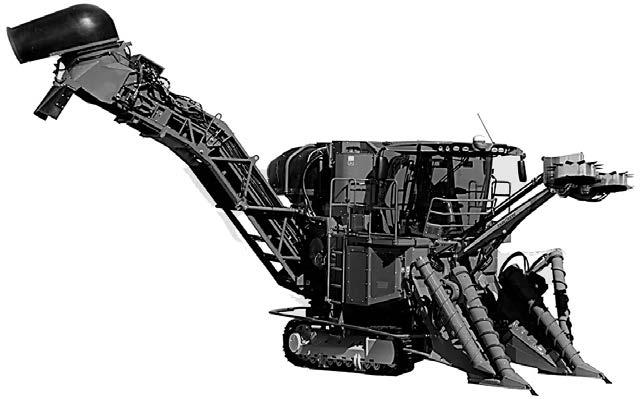


BY MICK QUIRK
Sustainability is not a common topic of discussion at backyard BBQs. In fact, its more likely to be a conversation stopper, with a long pause until the chat is steered on to more immediate and well-defined topics of common interest such as family, work, sport and the weather. And, of course, how the Cowboys will fare this year.
This should not surprise anyone. Sustainability is one of those loosely defined concepts that means different things to different people, and is so overused in government and corporate lingo that its heartbeat is faint. Often, the word is used to justify one person’s need for someone else to do something differently. Can the concept be saved and used to good purpose?
I think that it can be saved and that the effort is worthwhile for the sugarcane industry.
Make the concept important to you
The sustainability concept should start with individual farm businesses – use it to help organise your knowledge of the things needed to sustain the farm business over time. For example, to provide the best opportunities for good crops and good returns over time, each grower needs:
Healthy soil
Optimal nutrient management
Improved varieties
Weed and pest control options
Labour
Effective harvest groups
Well-performing mills
Community acceptance
Minimal regulation
Biosecurity
Finance
Ways to manage variability in climate, prices and other business risks
Continued market preference for Queensland raw sugar.
I am sure growers can add many other factors. The important thing is to then assess, for your own situation, which of these many factors currently have the most impact on the sustainability of the farm business (the current threats), and which of these are likely to become critical if current trends continue (the emerging threats).
For example, a grower might see the main, current threats to their sustainability as variety choice, mill performance, and community action while their ‘emerging’ threats could be harvesting capacity, increased chances of a new pest, and loss of market preference.
In this way, a sustainability profile is built by people on the ground to identify the main risks to their farm businesses, and the action(s) needed to tackle to secure a sustainable future. In the same way, a sustainability profile could be built for your local productivity zone, for your mill district, and for the industry Statewide.


Why do you need this concept?
A lot of this seems intuitive or self-evident – why do growers need this approach to organise their own knowledge?
Documenting your needs and those of your district in a systematic way helps put you and your industry on the front foot:
It helps communicate your needs and concerns, and identifies which issues you can address individually and those needing collective action.
It informs the actions of CANEGROWERS for the district and Statewide.
It ensures government and other industry stakeholders know your actual needs.
The bottom line
A useful sustainability strategy requires a good analysis of the issues most likely to threaten the current and future
sustainability of cane farms, and identifies the actions needed locally and statewide. It can build on the initiatives already undertaken by districts, and help direct additional effort and resources.
This is not about ignoring the broader sustainability concerns of our many stakeholders. Rather it is about anticipating their needs, knowing what we have done (and what else could reasonably be done) to address these needs, and managing expectations accordingly.
Many government and corporate entities have sustainability strategies in place to show a response to their financiers, shareholders, and/ or constituents on issues like climate change, labour management, and good agricultural practice.
Our actions will be most effective and efficient if based on a solid industry sustainability strategy built on grassroots input.
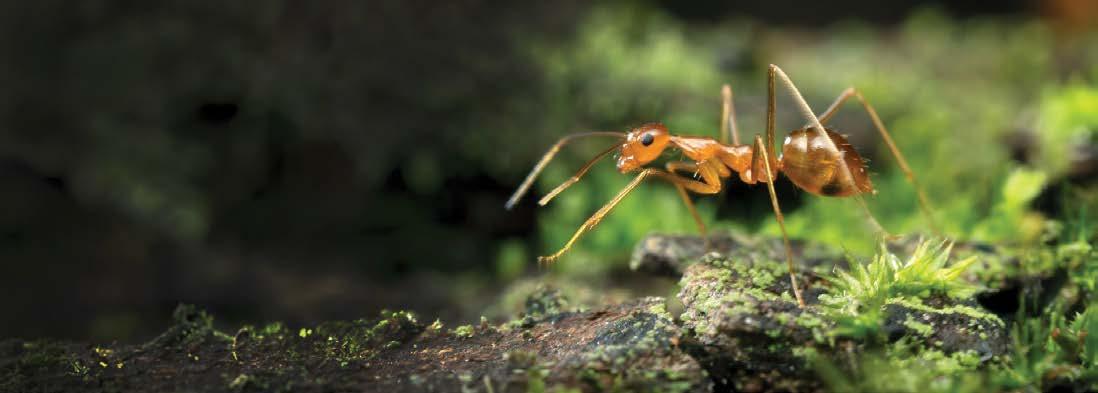

BY BURN ASHBURNER
In an ideal world what could relationships in the sugarcane industry look like?
I think it would be along the lines of a relationship which had open sharing of information and a concern that all members of the value chain are making sufficient profit to be at least sustainable. This would take incredible trust and very mature debate and discussions.
At some stage I assume there was good information which led to the cane payment formula as below.
Cane price = Sugar price*0.009*(CCS-4)+constant
The relationship was probably a regulatory one but about 100 years ago it was agreed that growers would share in the sales of the final product – raw sugar. Thus, the cane price is based on the raw sugar price. This gave the incentive for growers and millers to produce and extract sugar (CCS).
Further it was agreed that a fair split would be two thirds of the raw sugar income to growers and one third to the miller and that at the time 12 CCS was a good average base CCS. Thus, the miller got the first 4 units of CCS (one third of 12 CCS units) which is deducted from the grower. I have no idea how the two thirds one third split was arrived at but assume there was a sharing of miller and grower costs at the time.
It was also agreed that the mill could only extract 90% of the CCS so 10% was lost which is seen in the 0.009 adjustment in the formula.
This meant growers kept 90% of anything above 12 CCS so had the incentive to increase CCS and millers kept anything above the 90% extraction so had the incentive to improve the extraction of sugar. We now have growers at about 14 CCS and millers extracting 100% or more of the CCS. These positive incentives worked.
What the formula also did was incentivize growers and millers to reduce their costs and one way to do this was to transfer costs to each other to increase their own profitability at the expense of the other. This cost shifting has possibly been going on since the formula was implemented and
growers and millers have spent time and effort scheming of how to shift costs and defending their positions.
My understanding is that the constant in the formula was designed to balance out some of the shifting costs.
Thus, we have a contractual/legal relationship based on the Cane Supply and Processing Agreements (CPSA’s) which again is steeped in history with little thought of win win outcomes. It is interesting to me that with deregulation and the negotiation of the first commercial CPSA’s very little changed from the regulated agreements. It was too hard, I imagine, and perhaps there was not the forum to have safe discussions.
As an industry we have little idea whether the two thirds one third split is still reasonable and allows each party to remain profitable. We can only speculate that recent mill closures, the milling maintenance deficit and performance and declining cane supply are symptoms that all is not well and can lead to a downward spiral. Where there is a good cane supply and a mill performing adequately all seems to be well.
We need to maintain the CSPA’s and the contractual relationship as this is good business. However maybe now is a good time to find a way to develop a relationship which will assist to reinvent the industry over the next 10 to 20 years. The need to stop the downward spiral combined with the bio economy possibilities may give us an opportunity.
This is what the Sugar Plus Roadmap was all about although it seems to have had little traction to date. We need to have trust and maturity with good sharing of information.
CANEGROWERS are working with ASMC to see if there is an appetite to do something different. This is very scary territory as all members of the value chain will feel vulnerable like dogs circling each other with stiff legs and must genuinely want to be at the table. We are fortunate to have a strong CANEGROWERS and we will have to navigate the noise from the wide range of grower views to develop the necessary relationships.

BY MATT KEALLEY
All CANEGROWERS members are invited to complete the 2025 Member Survey.
The survey is an opportunity for you to share your opinions and ideas on CANEGROWERS. This will help CANEGROWERS to evaluate member needs, advocacy, products and services.
The survey will be open for the month of March 2025 and each member will receive an email with the survey link. It will also be available on the Member Resources page of the CANEGROWERS website.
Your answers will be anonymous and by completing the survey, you can go into the draw for your chance to win some great prizes.
Insight from past member surveys
CANEGROWERS has been undertaking surveys of its members since 1993. The data collected over that 30 plus year period offers great insight into trends on key issues, grower confidence, and member engagement as well as feedback on communications, services, benefits and influence in the industry.
In 2010, growers listed securing the future of the industry, a decline in the number of young farmers, limited succession planning and sugar marketing among their top concerns.
In 2021, the survey revealed a desire to get all sectors of the sugarcane industry working together, implement strategies to connect with younger growers and sugar prices, input costs and regulations were the most important issues facing the industry.
The issues over the past 15 years are still relevant and CANEGROWERS has acted on them including securing grower choice in marketing, developing the Marketing Information Services and Business Essentials program to help with succession planning, farm budgeting and sugar pricing.
CANEGROWERS was instrumental in leading the Sugar Plus industry roadmap and has been pursing its implementation by looking for diversification opportunities in biofuels and Sustainable Aviation Fuels.
CANEGROWERS has also implemented the Next Ratoon mentoring program and is working with our young growers in the districts. We have tackled fertiliser pricing, electricity costs, and regulations including load restraint, reef regulations and chemical application.
Participating in the CANEGROWERS member survey is more than just answering a few questions, it’s an opportunity to shape the future of your organisation and enhance your membership experience. Here are three compelling reasons to get involved:
1. Your voice matters
By participating in the survey, you have the power to share your unique insights, opinions, and experiences. Your feedback helps CANEGROWERS understand what’s working well and what needs improvement. It’s your chance to influence the advocacy, products, services and benefits that CANEGROWERS offers.
2. Drive positive change
Your feedback contributes to meaningful improvements at CANEGROWERS . Whether it’s better events, enhanced communication, or new member benefits, your input helps the organisation identify areas for growth.
3. Be part of the solution
Engaging in the survey shows that you care about the success of CANEGROWERS . It’s an easy yet impactful way to contribute to its progress. Your participation ensures that the CANEGROWERS evolves in a way that reflects the collective voice of its grassroots members.
The survey allows you to highlight new ideas, suggest programs, or advocate for initiatives that matter most to you. By sharing your vision, you can help CANEGROWERS to build a stronger, more dynamic organisation that meets your needs and shapes the future of the sugarcane industry.

BY CHRIS COOPER
Many growers at some stage will be owed money as a result of some transaction.
It might be the sale of a piece of surplus farm equipment, or it might be the outstanding payment for cane trash that a business has purchased, baled, and taken and not paid for. Whilst most times, people and businesses do the right thing and pay on time as agreed, default can be made in the payment of monies owed as and when they are due. This article provides some things to think about and some options to consider when monies are outstanding.
Consider the nature of the obligation to pay. Was the arrangement a verbal agreement or written contract. Both verbal contracts and written contracts are equally enforceable although there is less opportunity for dispute about the terms of the arrangement if there is some form of written document or correspondence detailing the obligations and payment terms.
Has the time for payment passed. It is usually better to follow up overdue payments promptly once they are due. There are legal time limits about recovering monies owed and can be six years.
Consider any terms of the contract that provide for what to do if payment is not made on time.
Consider the nature of the relationship with the person who owes the money who is called the debtor. Is it ongoing or one off.
Consider whether a compromise or discount is worth discussing with the debtor to resolve the claim without having to go through formal recovery processes.
Depending on the amounts involved seeking legal advice early might be worth considering.
Contact the debtor and discuss the situation. Try and reach an amicable solution. Resolving the dispute by discussion and negotiation is usually the best option.
Communicate politely and assertively.
Send a formal written letter of demand that specifies the amount owning and gives a period to time to pay, say seven days, before further action and steps will be considered.
Keep a record of these attempts to recover the money.


Contact the local CANEGROWERS office who may be able to assist with sugar cane industry related matters. In some cases, either the local CANEGROWERS office or I can assist by issuing letters of demand to the debtor as we recently did successfully for numerous debts owed by trash company Oreco to various cane growers.
For some debt disputes, especially where there is an ongoing relationship, it may be possible to apply to the local Disputes Resolution Centre. The Centre can offer free mediation services that can involve an independent mediator bringing the parties together to try and seek a resolution. This is a no cost service that has a good record of successful settlements. These centres are in most cane growing regions and can be accessed through the local Magistrates Court or directly online.
If the debt still remains unpaid after exploring these options, then there is always the court/tribunal process that can be pursued.
For claims up to $25,000 the Queensland Civil and Administrative Tribunal (QCAT) is the relevant tribunal.

If the claim amount is over $25,000 then depending on the amount the relevant court will be the Magistrates Court, District Court or Supreme Court.
QCAT provides a fairly simple and inexpensive process for dealing with small debt disputes. It has helpful resources to enable parties to handle the matters themselves at low cost without lawyer participation in hearings.
If the court or tribunal makes an order that money is owed, then it is required to be paid. If the debtor still refuses to pay enforcement action is available through the tribunal.
This article contains general advice only. The particular facts and circumstances of each case always need to be taken into account.
The comments in this article are general in nature. For further free advice and information about this topic or other legal matters, members should contact their local CANEGROWERS office or please contact CANEGROWERS Legal Adviser, Chris Cooper on Free Call 1800 177 159

FIRST 5 LINES FREE* FOR CANEGROWERS MEMBERS!
Book online 24/7 at www.canegrowers.com au or email us at ads@canegrowers.com.au
Next deadline is 19 February 2025
Austoft 92 wheeley, rubber rollers, 3 blade chop, leg basecutter, used as plantcutter, hard to fault. Fiat 115/90 2wd. New Holland M135 4wd, new motor. JD3520 full track, GPS. Eco Grande 28 plate offsets, near new. Ph: Gordon 0429 941 218
2015 Massey Ferguson tractor 7624 Dyna 6,240hp, front suspension, GPS fitted, 3,031hrs, two-way radio, serviced regularly, tyres excellent. $130,000. Ph: 0427 525 173
Maschio G350 rotary hoe. Make an offer. Ph: 0439 965 921.
John Deere 2018 CH570T cane harvester. Ph: 0438 988 176
HBM bean planter, HBM old style, $300. Ph: 0427 563 056
Wheeled Austoft 7000 ser. no. 7372, 3 blade chop under slung base cutter box, BSES front. Main eng. double disc zero/min till. Hydraulic drive planter ser. no MEBPO21. 1,000L Cropland tank. 2 x 5t double tip plant bins. P.O.A. Ph: 0419 988 158 or 0417 720 764
JD 7710 4WD tractor $45,000 plus GST; 10ft Gasson slasher $19,500 plus GST; 7ft Howard slasher $8,500 plus GST. Ph: 0427 680 660
Hino FS. 2003, 6 x 4 tipper truck, 18 speed road ranger, 4.7m body, swing tailgate, pull over cover, ring feeder and some parts to go with sale. Very good condition. $80,000 + GST Ph: 0437 434 280
New cane stool splitter discs 30" x 10mm boron steel, $200. Ph: 0427 044 443
Toft 6000 L10 Cummins engine. 2,000hrs, swinging knife, new elevated chain sprockets and wear strips, floor still good, lots of new hoses, good reliable machine. $14,300 incl GST, price negotiable. Ph: 0408 665 955.
2020 Case 8810 fulltrack cane harvester. Purchased 2021, cut 3 seasons. In good condition with plenty of spares. Ready to cut. Tully. Ph: 0407 160 758
2 x 440/65 R24 tractor tyres $1,100 incl GST each. 2 x 540/65 R34 tractor tyres $2,100 incl GST each. All four types as new only done 500hrs. Ph: 0427 665 759
Expressions of interest for shares. Email rigato.office@bigpond.com with offer or any questions.
* As a FREE service to CANEGROWERS members, Australian Canegrower will print suitable classified advertisements UP TO 5 LINES FREE, FOR ONE ISSUE ONLY. A charge of $5. 50 will apply for each extra line or part thereof. A charge will apply for advertising of non-cane growing activities. Advertisements must relate exclusively to cane farming activities, such as farm machinery, etc. Advertisements from non-members are charged at $11 per line incl GST. Only prepaid ads will be accepted.
2001 Isuzu service truck FRR series, diesel, 3 seater with welder, hydraulic hose maker, compressor, numerous compartments fully lockable $50k +GST, 12m V-blade $10k + GST, RES Dolly trailer $20k + GST, 44 plate (28" plate) and 24 plate (32" plate) Baldan offset disc ploughs, 10L Bunded fuel tank $10k + GST. Ph: 0409 580 586
Kubota Zero Turn ZG 222 with catcher 48" cut. Fiat 980 2WD – 3,500hrs. Fiat 1000 2WD –5,000hrs. John Deere 4040 2WD – 3,600hrs. Chamberlain JD 4080 2 WD – 5,000hrs. Case 2590 2WD – 5,700hrs. Silvan Euro Spand CX2 spreader, portable bulk bin, Bunning Lowlander Mk 40-60 ag spreader (near new), complete tracks to suit cane harvester, and fuel trailer tank. Mulgrave area. Ph: 0407 160 673
1997 JD 7810 4x4, 7,896hrs. Quade box., duals 20,8 38, 70%. Intergrated JD auto steer, 2630 JD screen and JD 3000 RTK reciever. JD Q-hitch. In cab 10" monitor and rear camera. Tinted windows. Cab in good condition as per whole tractor. Total rebuild of rear end 2yrs ago, receipts available. Original owner. $100K + GST. International 1486 2wd cab tractor with double bin trail with 7,000L tank, honda pump and truck crane mounted, ideal for planting, $30k + GST. 120" Howard rotary hoe with roller and rippers, $15K + GST. HBM heavy duty billet planter, new dip, elev chains, drive shafts and bushes. New drive tyers. Stainless boxes, holds over half ton. Rear wheel steer. Tanks and PTO pump for tractor, $30K + GST. 2.5t Gessner fert box with double disc openers and 300L tank and tool bar attachment to fertise plant. On 3-point hitch. $25k + GST. Case 28 plate 770 offsets, new tyres with 30" round discs, fronts worn to 28" rear 30" with cover discs. 2 new spare 30" discs $20K + GST. Ph: 0428 682 886
Case/Stiger 9250 & 1200 Obryan ejector bucket. With cushion hitch. 6,366hrs. Fitted with T3rra Cutta, I-Grade , Panasonic Tough Book 726hrs and JD 3000 SF1 cab receiver, no auto steer. Also have T3rra design software to transfer to your computer. Does not come with bucket receiver or in cab John Deere screen. Have an assortment of spare parts for bucket and tractor. All in working order ready to work. Selling as is where is. Ph: 0428 682 886
Set of half tracks to suit John Deere 3520 cane harvester. Ph: Ferdinand 0421 043 609
3T fertiliser stool splitter stainless steel box 1.5–1.8m spacing $25,000 (+GST). Ph: 0429 912 135
2012 John Deere 7200R tractor PTO, 3PL with quick hitch, 4 sets of remotes, front weights, front tyres 540/65R34, rear tyres 650/85R38, 4,510 hrs. In good condition. $150,000 + GST Ph: 0427 976 416
Howard Rota Vator HR51 Rota. Ph: 0457 255 961.
Terranova rotary hoe 120" Bonel 4 disc plough square. Mulgrave area. Ph: 4056 1474
One pair 21L-24 Armour earth moving/quarry tyres, currently on a backhoe. Good condition. $700 each tyre plus GST. Ph: 0419 150 350
36 plate case 770 offsets, 30" discs $40,000 and HBM plant cutter with topper $4,400. 7ft slasher with Howard box – all refurbished –$10,000 incl GST ONO and 3 row fill in grubber with folding wings $4,000 incl GST ONO. Ph: Gavin on 0448 345 139
Massey 4608 excellent condition, 2,000hrs. Ph: 0418 972 705
2006 Case IH JX109OU in good condition. Always serviced – 6,800hrs $24,200 (incl GST). Tully area. Ph: 0427 665 759
Tractor TE20 good condition $3,300 GST incl. Tractor AV International 130 with fertiliser equipment and scarifier $3,300 GST incl. Tractor AV International 140 with spray equipment $3,500 GST incl. Ph: 0428 183 307
Howard CH 2000 rotary hoe 4.2m wide, hyd 5 tyne ripper hillers new blades. $45,000 plus GST. Ph: 0429 912 135
2016 John Deere R4023 self propelled sprayer 1,500hrs, 2,200L tank, 85ft boom, GPS ready. $235,000 plus GST. Ph: 0429 912 135.
10 blade Faggy chopper box for 3510/3520. $6,000 + GST. Ph: 0437 434 280
Power harrow / airator for soil – fits on a rotary hoe $900. 2 old fertiliser box implements – each $300. 186 Ross Road Deeral. Ph: 0412 968 434
Valley centre pivot 8 span all running gear tyres & rims $1,000 gearboxes $750. Electrical motors & gear boxes $1,000 each ONO. 2x torsion axles v-shape 2,200kg each $500 ONO. Ph: John 0418 198 177
Newton 4T tipper bin $4,000 + GST. Hardi spray tank 850L, 3-point linkage $4,500 + GST. Ph: 0429 653 461
6 cyl. Perkins turbo-charged motor, mounted on trailer to Kelly & Lewis water pump $5,500; 6T Newton bulk fertiliser bin $2,500. Ph: after 7pm or txt 0402 686 714 / 0407 144 637
2012 Case 8800 fulltrack cane harvester fitted with Trimble GPS and new walking gear. All in good condition. Mulgrave area. Ph: 0407 160 673
1980 Ford 7710, 4WD, 4 cyl, canopy, 5,323hrs, $21,000. 1960 Inter tractor 574, 2WD, 4 cyl, canopy, $9,500. 1960 Inter tractor 574, 2WD, 4 cyl, canopy, 4,891hrs, $7,950. 1975 Cat D3 dozer, angle tilt blade, 4 cyl, hyd tow hitch, root rake blade, 4,836hrs, $51,900. 2010 Kubota ME9000, 4WD, cab with trimble with GFX-750 GPS, 5,031hrs, total for both $47,900. 2018 Kubota, 4WD, M7040, 4 cyl, canopy, 482hrs, $46,900. Ph: Mark 0427 017 717.
1968 International Farmall 756, 2WD, tricycle, 6 cyl, 5,560hrs, $5,950. 1993 140" Howard rotary hoe, crumble roller, serial 060301095, $24,500. 2006 Case iH 7700 full track harvester, Iveco 10.3L, 6 cyl motor, 2,912hrs, $156,000. 1976 rear feed whole stick planter, s/s fertiliser boxes & chutes, 2x200L spray tanks with 4 sprays, hydraulic ram trailer hitch, $4,250. 1990 8-ton bulk fertiliser bin, 3 easy chute doors, 4 stands for storage, $5,150. Ph: Romy 0467 198 700
Fertiliser bin M.S.W, double row, 4 tonne stainless bin, with double compartment and 4 cutters $25,000 (incl GST). Ph: 0400 729 457.
Heavy duty two tines (legs) to suit rotary hoe, $1,000 incl GST. Ph: 0438 988 858
2022 Case 9900 cane harvester. Ph: Craig 0436 332 044.
Liquid fertiliser applicator croplands rate controler, adjustable centres and new pump. Ph: Craig 0436 332 044
Rotocult 1 shot cultivator $7,000 ONO + GST. Ph: 0149 988 158
1980 Ford TW20 tractor, 3,500hrs maximum, recently painted, good condition, make an offer. Ph: Laurence on 0419 666 544
New Holland T6030 tractor 1,750hrs. Near new tyres VGC $57,000 + GST. Ph: 0407 154 250
2020 Case IH Austoft 8010 cane harvester, machine hours 8,250 and elevator hours 4,680, Scraper and Gripster tyres. All case modifications complete. All drive components current. Ph: 0428 635 922.
28 plate Napier offset discs, working condition, $5,000. Ph: 0448 842 792
BT D6 Dozer, high lift, angle and tilt blade, five roller, 14" tracks, make an offer. Ph: 0438 743 685
3-point Linkage International plough, 4 furrows, 1 drag plough – 3 furrows, self lift, make an offer. Ph: 0438 743 685
Moore Scoopy LD3 4 wheel drive, fair condition, make an offer. Ph: Reno on 4777 6148 after 6pm.
LD3 Moore Scoop 4WD in fair condition, runs good, brakes need help. Ph: after 6.30 pm 07 4777 6148
4T Newton tipper hooked to 4280 Chamberlain tractor. Will separate if required. Ideal for billet planting. Herbert River. Ph: 0416 174 014
2017 Isuzu dmax dual cab with alloy tray, 67,400km, new tyres, rwc, one owner in VGC. $43,000 ONO. Ph: 0438 821 683
New Holland T6030 tractor, 1,746hrs, near new tyres, VGC. $65,000 + GST. Ph: 0407 154 250
Southern cross TCE3000 travelling irrigator. Herbert River. Ph: 0408 889 446.
Case Magnum 315 2012 dual tyres front and rear with weight pack, Trimble GPS, UHF and quick hitch 210,000 plus. Howard rotary hoe CH 2000 4.7m with crumble roller, $40,000 plus. Ph: Gavin 0408 782 419
Perkins 4 cylinder 236 pump engine for sale. $4,400. Ph: 0428 597 207
Rotary drum type stonepicker, SJC Engineering, tipper bin at rear, always under cover, little use, VGC. $12,000 plus GST. Ph: 0438 583 130
2006 John Deere 7420 135HP 4WD tractor, 4,813hrs, IVT, triple link suspension, hydraulics & wiring for Ag leader Versa/Paradyme. All tyres replaced after 4k hours. $60,000 plus GST. Ph: 0429 629 337
Irrigator Avoka 75 model. Capable of carrying two hoses, however hoses are not included. Good condition. $5,000 + GST. Ph: 0417 714 209
Hardi spray tank, Hardi pump and press reg, 4x row Irvin boom, 4x trailing legs. $6,600. Ph: 0400 948 630
Stick planter suscon box and tank mounted on planter ground driven pump and new tyres, $1,200. Ph: 0477 232 929
1990 Toft all rounder plant cutter plus assorted spare parts. $35,000 + GST. Ph: 0407 164 884
Kinchant dam water allocation. Give away. Ph: 0448 055 047
AutoFarm A5 GPS unit $5,000 + GST Ph: 0417 158 656 for more details.
3 x 26" McLeod stool splitter assemblies with fertiliser and confidor tubes. Ph: 0427 593 848
Case Maxxum 140HP tractor with front end loader with 4-in-1 bucket and forks/jib. Near new condition 168hrs. $140,000 ONO incl GST. Howard 7ft slasher, good condition $11,000 incl GST. Ph: 0418 770 218
Schneider Star Delta starter $1,900 ONO. Ph: 0447 733 366
L & L Wilkinson Haulage Pty Ltd widening drop deck and A trailer. Transporting cane harvester. Farm machinery. Farm implements. Pilot. Ph: Lee Wilkinson 0427 474 064
2 x planting 2.5t tipper bins $3,000 each ONO. Ph: 0437 649 296.
Massey Ferguson 8110 4-wheel drive with cab, 135hp, only 2,636hrs in good condition. $55,000 incl GST. Celli Tiger spike hoe, 2.5m wide with hydraulic crumble roller and oil cooler. VGC. Don Mizzi 741 model on Fiat 750 special turbo plus MF102 half-tracks to suit. 12t self-propelled 6x6 elev infielder. VGC. 6t side tipper on Leyland tandem. GC. Mackay. Ph: 0438 606 578.
6 rear wheel weights for New Holland TM155. Ph: Keith on 0448 057 574 or Brock Shailer on 0439 113 511.
2 tractor tyres 18-4-38, 75% rubber – $600 each. 1 plant cane or return grubber 14 tine – $1,200. A hodge plant cutter & two fan blower – $1,000. 1 Yedder 6 wheel on 3-point linkage frame for plant cane – $1,800. Ph: 0448 605 722
2 x new Trelleborg TM800 high speed 480/65R24 tyres. Ph: 0458 121 546
Hodge side dresser fertiliser box – with 4 front fertilizer coulters, 2 centre rippers with crumble rollers and centre drawbar at rear. Also can be used as a soil buster. Dimensions 1.7m to 2.05m. GC. In the Mackay area. $9,000 + GST. Ph: 0408 874 974 or 0418 874 974
John Deere 6520se FWD 5,100hrs, new AC power quad. Tyres 70% presents as a very clean and tidy tractor price $60,000 incl GST neg. VGC. Ph: 0438 424 538
Trailco 110x360m hard hose irrigator $23,000 incl GST. Koumala. Ph: 0429 027 377
Pegorano power harrow 100". $3,500 incl GST Koumala. Ph: 0429 027 377.
Various farm implements: Hodge 4-furrow reversible plough. 3 row McLeod multi weeder rake. Two tyres & rims to suit fiat 1000 & 1300. Agri/Master; CB538 size 24.5/32R/1 12 ply. Ph: 0417 612 883
Canetec BP2500 billet planter single row. New & ready for delivery. Built by Canetec in Bundaberg. $90K. Ph: 0422 669 695
Spring tynes 1 1/4 ins by 1 1/4 ins suit fert box – set of six $250. Ph: 0413 584 728
Tractors for wrecking. Case International 485XL $1,000. Fiat 1000 $2,000. Both start and go. Ph: Kevin 0435 026 622
KMC 3 bed folding wing fluffer. VGC, always shedded, ready to work. Ph: 0422 118 466
Wrecking MF 305 cane harvester, with spares. Price negotiable. Ph: Ron 0427 366 307 or Dean 0408 062 830.
Don Gough whole stick cane planter $550 (incl GST). Ph: 0413 584 728.
Ford 5000 with blade $12,000 incl GST. Bonel 2T belt spreader $5,500 incl GST. Trash incorporator $6,600 incl GST. 3-point linkage offset 16 plate $1,800 incl GST. David Brown 990 with loader $9,900 incl GST. Ph: 0419 577 110
Gessner 1.5T stool splitter good condition, $33,000. Toft J150 whole stick harvester modified to load onto planter trailers, $5,500. Bonel trash stripper fan always shedded good condition, $660. Don whole stick trash planter has fert boxes, water tanks (may need some repair) and suscon applicator, no trailers, $1,100. Croplands $1,100 tank and frame, no pump or boom, $4,400. Prices include GST. Ph: 0427 769 086
2 Farmall AMD tractors tin work is no good, engines have been open to rain have 1 good engine to go with or separately, best offers. International B 414 engine open to rain, best offers. Volvo BM 4400 front end loader. Good brakes and hand brake 14,000hrs works well + spares, $38,500. Prices include GST. Ph: 0427 769 086.
White Centurion center point suspension bogey tipper 2 way tailgate and electric tarp. Excellent condition, $44,000. JD cotton picker 4,000hrs with rear wheel assist, was going to use for a sprayer. Offers. Prices include GST. Ph: 0427 769 086
Ford 6600 tractor $6,000. Ph: 0403 064 708
Komatsu PC 228 US-3 22T excavator 8,000hrs. Tilt hitch lots of buckets, hammer etc, some rust and panel damage. Mechanically sound has been used for contracting. $66,000 for machine and 1 bucket. Extra buckets by negotiation. White Road Boss air bag rear suspension in excellent condition, $44,000. Drake low loader with top deck. Elevator stand, non widening, 17.5 rims, excellent condition, could use paint, $44,000. Prices include GST. Ph: 0427 769 086
Plant cane cultivator 2 x 1.6m row w/ 3 weeder rakes and tines, $1,320 incl GST. Land plane w/ 4m hyd blade, $3,300 incl GST. 2x1.6m row cultivator w/ 10 x 30ml tines, $1,320 incl GST. 4 wheel trash rake, $1,110 incl GST Ph: 0408 761 463
Rotary hoe 90 degree blades to suit Maschio G series rotary hoe. Brand new. These normally sell at $20 each new but are for sale at $6 each. There are currently 72 left hand and 72 right hand blades available. Ph: 0402 993 500
Massey Ferguson anniversary 105 harvester $7,700 (incl GST). Trash incorporator $7,700 (incl GST). Bonel 3-row cutaway $6,600 (incl GST). 3-point linkage offset 16 plate $2,300 (incl GST). Ph: 0419 577 110
Quinco side dresser fert box, Bonel plant cutter, 5 row plant marker 1.8 ctrs. Ph: 0473 989 961
New Holland T6070 tractor, $185K neg Challenge FEL, quad remotes, excellent condition, 450hrs. Ph: Justin 0415 626 715
Brand new Howard AH4000/255 2.5m heavy duty rotary hoe w/wheels $38k incl GST. Rocky Point. Ph: Greg 0421 277 126
Wanted – tt75 New Holland front 4x4 axil parts – planetary etc. Ph: 0439 375 301
Wanted to buy – Kubota Rtv side by side. Ph: 0407 761 364.
Wanted double 5 or double 6 tonne cane trailer. Ph: 0438 583 130
2 off JD rims (flange type 16” x 42”) with or without tyres. Size 480/80 R42 to suit JD7520 12 bolt 855PCD cast centre. Mareeba District. Ph: 0407 963 040.
2 x brake drums for front of Volvo F12 – 10 stud in reasonable condition. Ph: 0408 733 793
Wanted to buy a Patroni style hydraulic three point hitch. Ph: 0427 541 346
Valpadana interrow tractor in working order Ph: 0407 967 570
Looking for a good running condition dual row billet planter to be shipped to Mauritius. Please contact via mail if any available: dpaul@lamoisson.mu or ring Mauritius –(0011) 230 5984 4007
T450 Trailco irrigator. Ph: 0419 503 293
2 tractor tyres 13.6-38/12-38. Tully. Ph: 0437 681 397
HBM billet planter. Ph: 0429 651 233
Rotary hoe 120" to 140", prefer Howard. Spray unit with Irvin boom or similar 600L plus. Maryborough area. Ph: Roger 0419 788 376
Wanting 100 to 120 HP 6 cylinder 4x4 tractor. E.g. Ford tw 20., Fiat, Case ih, basic old tractor. Mossman, Herbert, Mackay (for Ingham).
Ph: Lloyd 0439 375 301
Shredder topper suit John Deere or Case or Toft or Bowder. Any condition. Ph: 0413 584 728
Double or triple tipper bin for NSW planting season. Happy to transport from QLD for the right unit. Contact: mildon.park@bigpond com or Ph: Richard 0412 156 622
Ferguson TE 20 with V8 Ford flattop engine, ½ tracks to suit Ferguson tractor, TE 20 Ferguson with reduction gearbox, Chrighton whole stick harvester with or without tractor. Mulgrave area. Ph: 0427 565 511
2.5 tonne or similar tipper bins suitable for billet planter. Mulgrave area. Ph: John 0427 563 318.
1996 to 2004 Toft/Case 7000, wheeled cane harvester. Ph: 0420 600 943
Austoft/Case wheel harvester 1995 to 2006 model – any area. Ph: 0417 193 385
4.5" Layflat hose in good condition. 200-250m. Ph: 0419 952 119.
New Holland 8970 tractor suitable for wrecking. Ph: 0419 710 280 or tctownley@bigpond.com
All panels for Fiat 780. Mackay / Sarina area. Ph: 0438 421 217
Hi clearance spray tractor. Must be a trike and must have air con cab. Send photos and information to 0407 639 985.
1x Ford 6600 or Ford 7600 two-wheel drive tractor. Ph: 0439 591 455
6 FT 3-point linkage grader blade in reasonable condition. Bundaberg. Ph: 0478 228 375
Tractor with FEL 100-140 HP up to $50k. NQLD area. Ph: Peter 0427 760 449

Cane farm Halifax total area 217 ha, CPA 126.4 ha. 2 minutes from Taylors Beach & 20 mins from Ingham CBD. Includes large machinery shed which has 3 phase power & water plus 2 smaller sheds. Price $1.62 million. For inspections contact Felix Reitano Real Estate on (07) 4776 5007 or email felix@reitano.com.au
288 Acres 35 minutes south of Maryborough, 200 acres under cane. Permanent creek with underground mains 4 bedroom timber home 12x9m shed with 3 phase power. Ph: 0407 398 852
Wanting to purchase a land title – Mackay District. Council approval ready to go. Cash sale no finance needed. Ph: 0407 426 626
Wanting to buy, cane farm in Mackay or surrounding areas. Ph: 0437 410 434
Looking to purchase a sugar cane farm in Proserpine or surrounding area. Require land only no house needed. Ph: 0451 272 057
Want to buy farm in Victoria Plains, Eton, Pleystowe area. Ph: 0490 029 387
Wanted permanent purchase lower Mary River water allocations on Mary River, Tinana Creek and channel pipeline sections of the scheme. Ph: 0427 930 696
